Past Performances
December 2025 concert
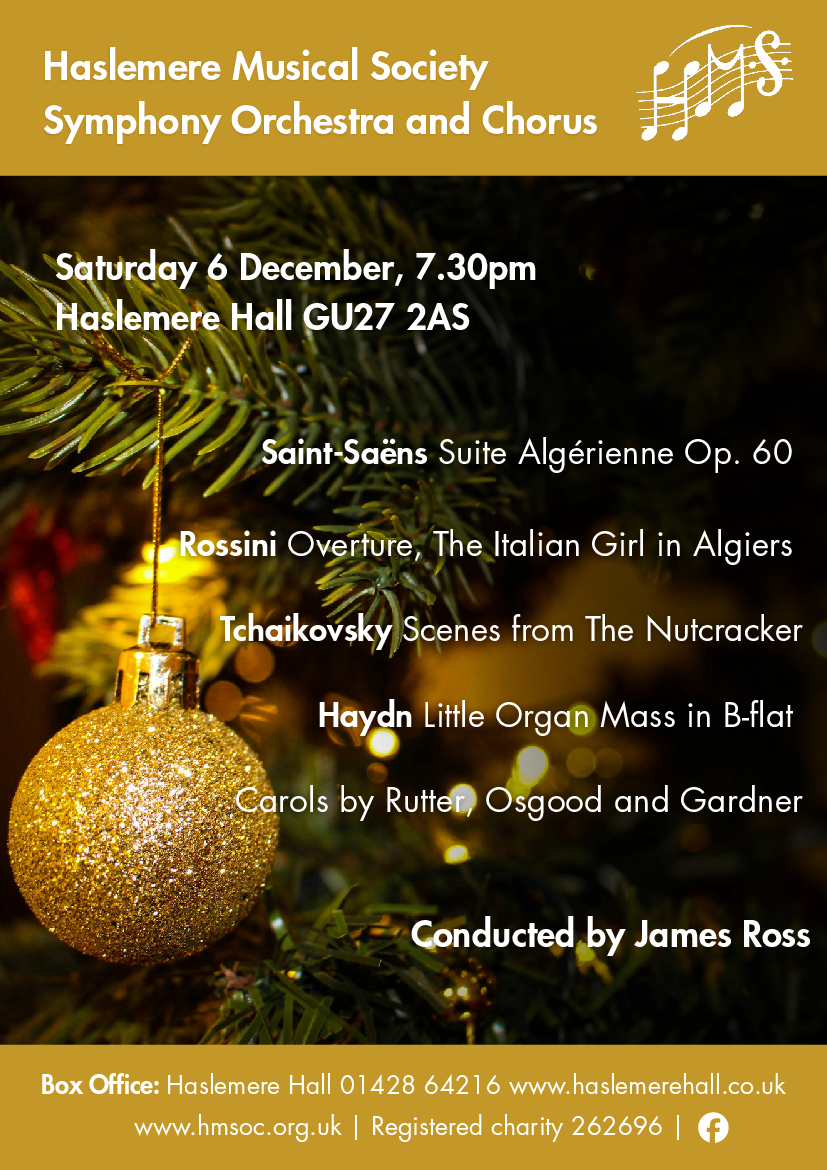 Haslemere Musical Society Christmas Concert
Haslemere Musical Society Christmas Concert
Sold out well in advance, HMS’s final orchestral and choral concert of 2025 promised a
rousing and typically varied evening to showcase the best of this historic society. Under the
assured direction of conductor James Ross, the musicians delivered a programme that
blended festive tradition with colourful orchestral storytelling, creating a memorable start to
the Christmas season.
Resisting the temptation to launch straight into Christmas fare, the orchestra opened with the
‘Trepak’ from The Nutcracker — an unprogrammed and thrilling Tchaikovsky teaser of what
was to come later in the first half — before embarking on the overture to Rossini’s 1813
opera L’italiana in Algeri. The players neatly captured the essence of this fastpaced comic
opera, in which the clever and determined Isabella arrives in Algiers, outsmarts the bumbling
Bey, avoids being added to his harem, reunites with her lover Lindoro, and orchestrates a
daring escape for them both — all conveyed with wit, charm, and Rossini’s trademark
sparkle, highlighted by subtle strings and lyrical woodwind solos.
The North African, Mediterranean brightness flowed naturally into Camille SaintSaëns’ Suite
Algérienne, which the orchestra approached with real enthusiasm. The opening “Prélude :
En vue d’Alger” was warm and atmospheric, with gentle strings and sensitively shaped
woodwind solos, while the “Rhapsodie mauresque” brought lively rhythms and vibrant
contributions from winds and percussion. The third movement, “Rêverie du soir à Blida,”
emerged as a particular highlight, played with lyrical warmth and a natural sense of phrasing,
and the concluding “Marche militaire française” provided a bold, confident finish, driven by
bright, wellbalanced brass.
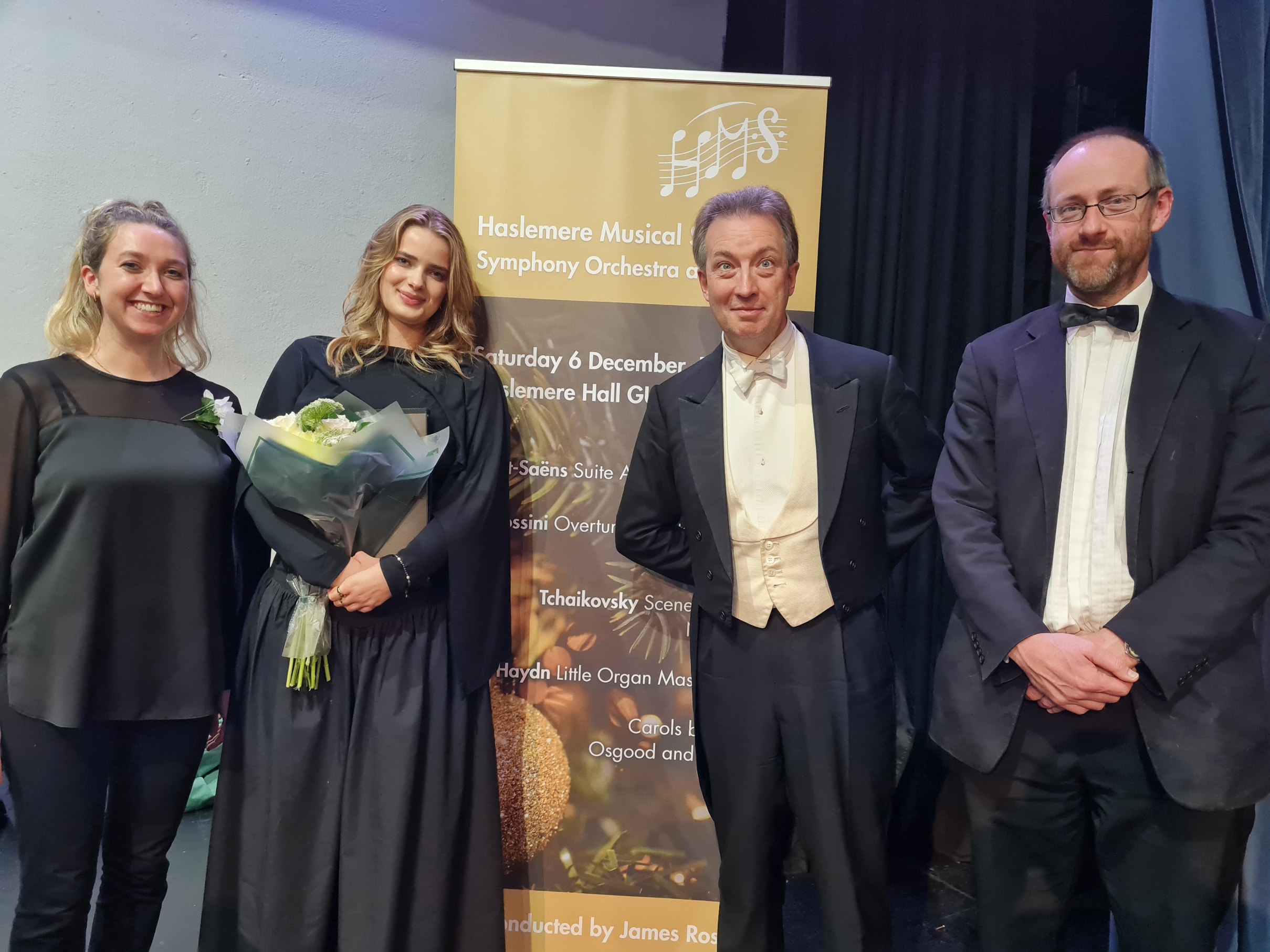 After the operatic sparkle of Rossini and the atmospheric sweep of SaintSaëns, the shift into
After the operatic sparkle of Rossini and the atmospheric sweep of SaintSaëns, the shift intoChristmas repertoire felt natural and well judged. Instead of beginning The Nutcracker at its
familiar opening, the orchestra moved straight into Movement 6 — the magical
transformation scene — allowing the festive mood to bloom instantly. The shimmering
strings and glowing brass created an immediate sense of winter enchantment carrying the
audience from Mediterranean sunshine into the snowy magic of Christmas with elegance
and ease.
Never missing an opportunity to educate as well as entertain, Ross’s programming avoided
the simplicity of turning to one of the more familiar, prepackaged orchestral suites. Instead,
he brought the audience directly into the heart of the scene, allowing the music to unfold and
develop as Tchaikovsky intended. The drama of the battle between the mice and an army of
gingerbread soldiers was brought to a close with a gunshot from the back of the orchestra —
perhaps a contemporary twist on the more traditional slipperthrow — and when the chorus
joined the orchestra for the beautiful ‘Snowflake Waltz’ at the end, we were given a small
taste of what would come in the second half. With the Nutcracker conveniently transforming
back into a Prince just in time for the interval, the audience was sent off for a wellearned
glass of wine and a mince pie.
The second half saw the choir take centre stage with a rousing performance of Haydn’s Little
Organ Mass. The ‘telescopic’ structure of the longer Gloria and Credo movements, with
multiple lines of text sung simultaneously, no doubt saved valuable Mass time on a Sunday
morning. But the more extensive Benedictus revealed a very different compositional style,
with glorious, lyrical singing from young soprano soloist Imogen Rowe in dialogue with Clive
Osgood’s delightful organ solo.
The concert ended on a Christmassy high with the choir and orchestra combining to deliver
three contrasting carols, the first of which was a new setting of I Saw Three Ships by HMS’s
very own Assistant Chorus Master, Clive Osgood. Its lilting rhythm and subtle orchestration
were matched by confident singing and clear diction from the choir.
The final leg of the evening’s programme saw HMS’s Chorus Master Catherine Olver take
the baton. Bob Chilcott’s setting of O Little Town of Bethlehem offset a new melody with
Vaughan Williams’s more traditional ‘Forest Green’, resulting in something gentle, charming
and effective. John Gardner’s Tomorrow Shall Be My Dancing Day took a medieval text and
set it to an instantly familiar rhythmic structure that proved very enjoyable; resisting the
temptation to take it too quickly (the metronome marking is surprisingly slow!), the choir
clearly relished it — and it set up the finale perfectly.
Christmas simply wouldn’t be complete without something from the genius of Sir John
Rutter, and his 1984 Candlelight Carol remains one of his most evocative seasonal works.
With its simple yet sumptuous orchestration and glorious choral writing — particularly in the
inner parts — it is easy to understand why Rutter has become synonymous with the season.
In all, this was a typically varied, challenging and rewarding programme that sent the
audience off into the night after a glorious evening’s entertainment.
Words by Will Unwin
Autumn 2025 orchestral concert
usual venue, Haslemere Hall, for the fine, barrel-vaulted acoustics of St Christopher’s Church,
Haslemere. This was a well-attended concert, entirely of symphonic music.
The opening piece, the Overture in C, by Fanny Mendelssohn, was her only purely orchestral
work. The slow, romantic introduction, which led on to dramatic string playing and a stately
call and response between trumpets and horns, showcased the orchestra’s excellent command
of dynamic.
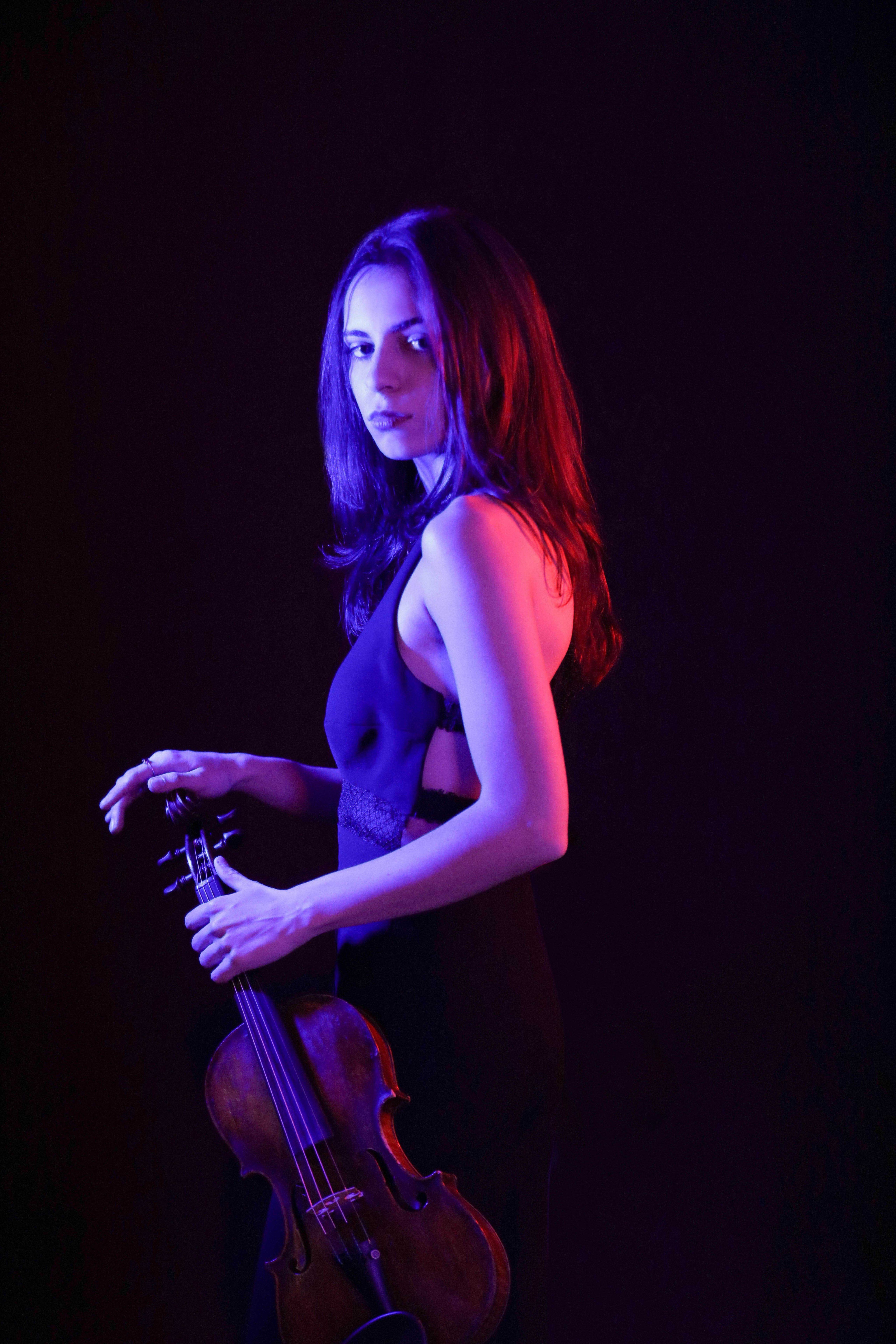 For the second work, Max Bruch’s First Violin Concerto, the orchestra were joined by the
For the second work, Max Bruch’s First Violin Concerto, the orchestra were joined by theoutstanding young violinist, Elfida Su Turan, who had already played here in May this year. As
a joint winner of the Haslemere International String Competition, she soloed with the London
Mozart Players, as part of the Haslemere Festival.
The Concerto awakens imperceptibly on the timpani, a melody begun in the flutes welcomed
the violin, which soon seized centre-stage with a dramatic theme. A long soft note on the
strings then the orchestra wove deftly, one seductive tune after another, to buoy up the violin.
This was such a live performance. Elfida, clearly relishing the virtuoso demands, brought out
the best in the orchestra and engaged with the audience too. The Finale released the energy
and fun of a jaunty Bohemian dance. With passionate double-stopping the violin launched the
orchestra into space. There was never a dull moment, the violin and orchestra were partying
together and finished in dazzling high spirits. This performance was an undeniable triumph and
an excited audience gave them a standing ovation!
After the interval, the orchestra played another firm Mendelssohn favourite - this time from
Felix - his Symphony No. 3, the Scottish. In 1829 he came to Scotland, toured the relics of the
country’s gruesome history and found the scenery deeply romantic. The symphony opened
with a motto theme, picturing the ruins of Holyrood Palace. The theme blew up a Highland
storm, before calming and striking up a Scottish reel. The slow movement, beautiful and
tender, hid a funeral march. The Finale started in a sombre, minor key and built to a joyous,
major conclusion.
These were vastly entertaining performances of challenging works in the classical repertoire.
The HMS Orchestra and their Leader, Tom Horn, with Director of Music, Dr James Ross, are to
be congratulated on the wonderful skill and polish they have built up over the last few years.
Words provided, with thanks, by Martin Robson
May 2025 concert
Haslemere presents Shakespeare in Music
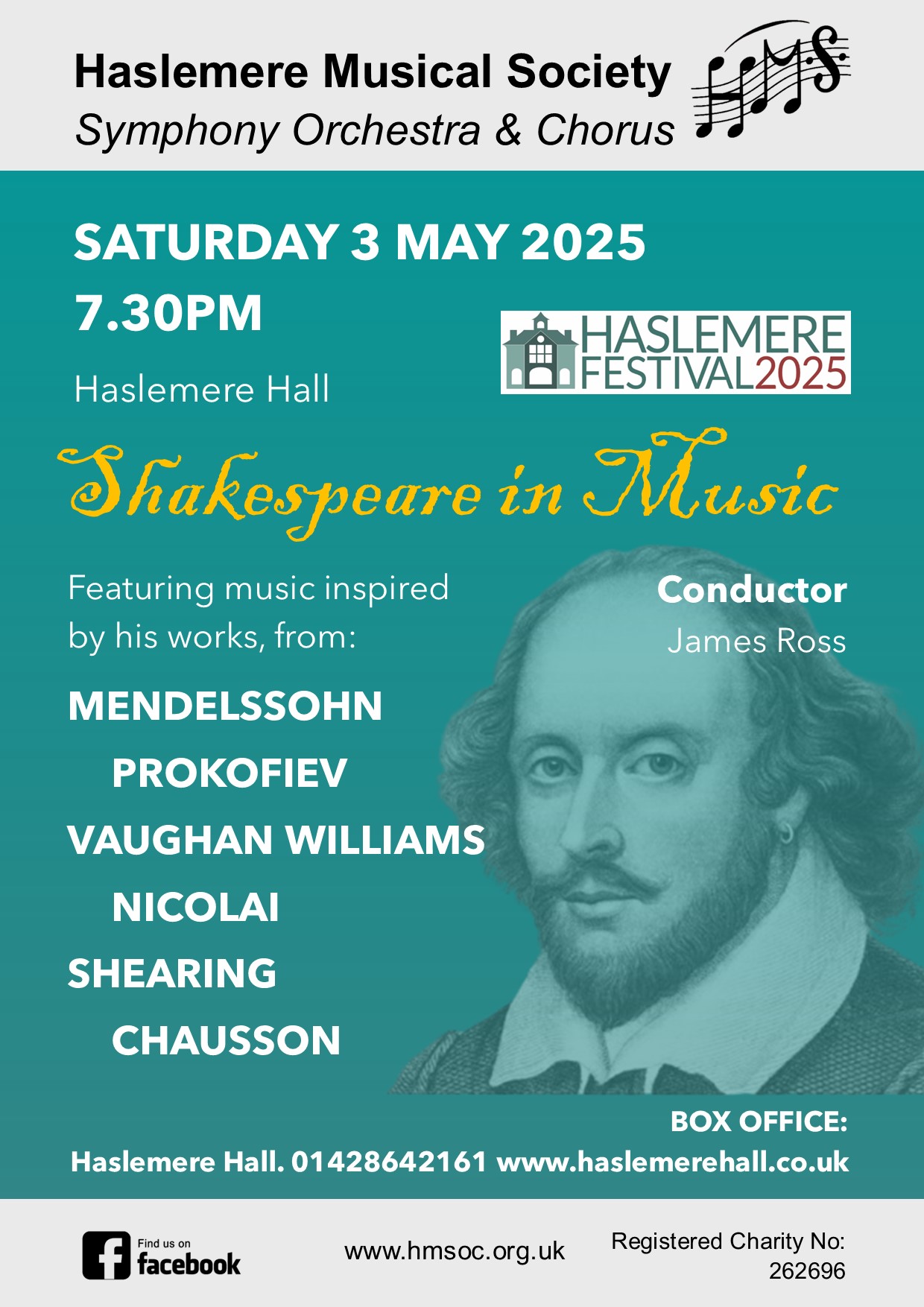 The 2025 Haslemere Festival began with an evening devoted to the plays and sonnets of William Shakespeare that have provided the inspiration for the music of a number of composers to represent the
The 2025 Haslemere Festival began with an evening devoted to the plays and sonnets of William Shakespeare that have provided the inspiration for the music of a number of composers to represent thecharacters and drama of his works. These include Felix Mendelssohn, Sergei Prokofiev, Otto Nicolai, Ernest Chausson, George Shearing, our own Ralph Vaughan Williams and many others. On Saturday, 3 May, the Haslemere Musical Society gave its capacity audience the opportunity to enjoy the Shakespearian music of these composers at Haslemere Hall.
In a wonderful mix of choral and orchestral works with inserted speeches from the plays, the evening was a rollercoaster of musical and dramatic delights. Extracts from the dramas were recited by Fiona Cullis and David Greenwood, members of the Haslemere Thespians. The orchestra and chorus were conducted, as usual, by Dr James Ross.
The evening began with the hugely popular Wedding March from Mendelssohn’s music to A Midsummer Night’s Dream, which was played confidently and with gusto by the orchestra. This was followed by a less well known work, Nicolai’s The Merry Wives of Windsor Overture. This is a delightful work, allowing the various sections of the orchestra to display their talents.
Not many people know that English born composer and jazz pianist, Sir George Shearing, also wrote music
inspired by Shakespeare’s writings. His Songs and Sonnets, composed in 1999, were enthusiastically sung
by the Musical Society’s choir, accompanied by Clive Osgood at the piano. The seven songs are (1) Live with
me and be my love; (2) When daffodils begin to peer; (3) It was a lover and his lass; (4) Spring; (5) Who is
Sylvia? (6) Fie on sinful fantasy; (7) Feste (Twelfth Night) When that I was and a little tiny boy. These songs
were a special treat and the choir gave them a splendid rendition.
T
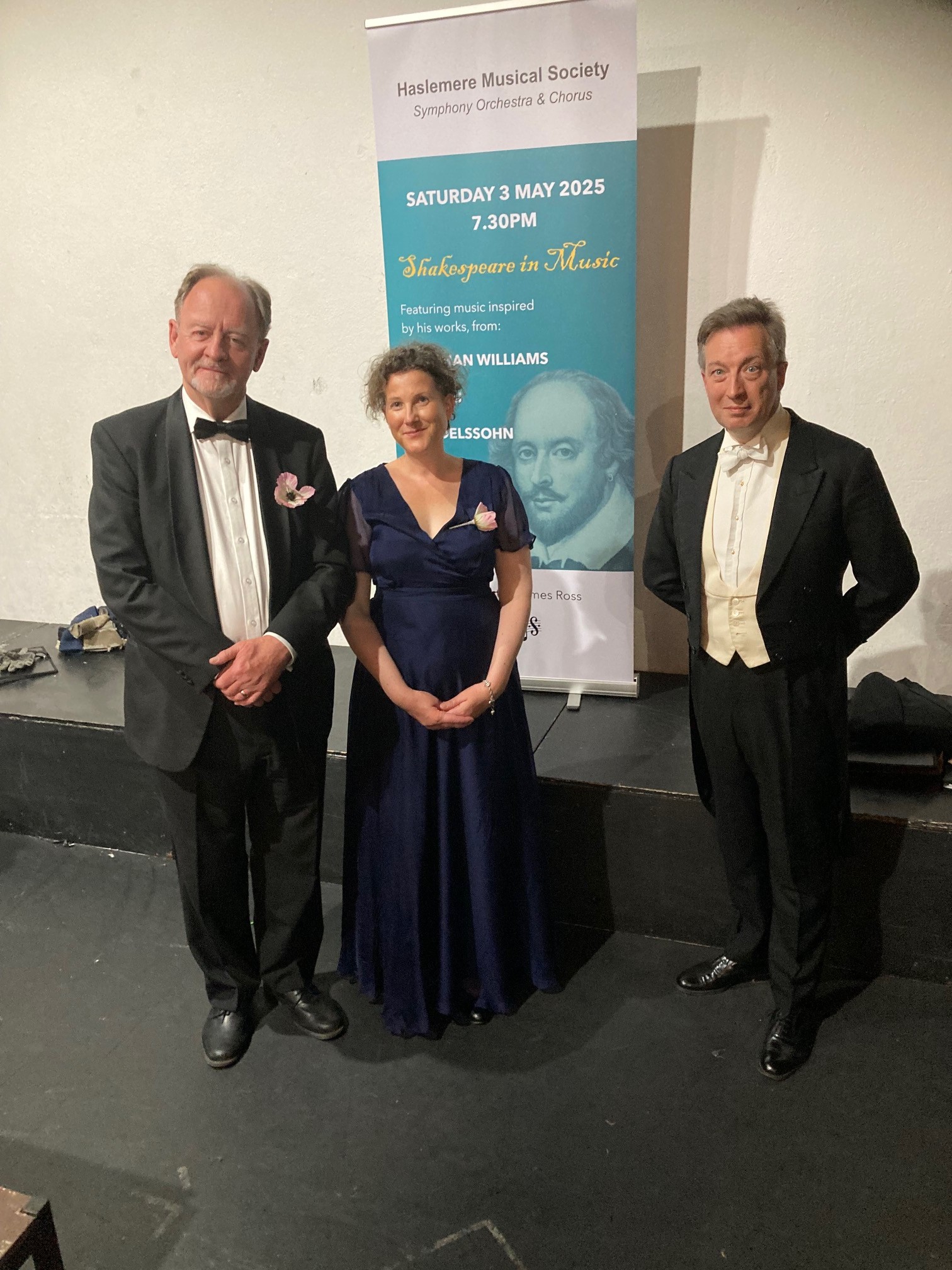 he first half was completed with a resounding performance of the second suite from Prokofiev’s ballet Romeo and Juliet. The opening jaunty, march-like theme of Montagues and Capulets (Dance of the Knights) with much pomp and power is extremely popular. The eerie but gentle flute melody of innocence introduces Juliet as a child. This was followed by Friar Lawrence with its delightful bassoon solo before with a quick Dance of the Five Couples featuring an oboe solo. The suite is completed by Romeo at Juliet’s Grave, a tragic musical lament. The wind section of the orchestra was exposed in this music and they were a credit to the orchestra. This was a very fine performance overall.
he first half was completed with a resounding performance of the second suite from Prokofiev’s ballet Romeo and Juliet. The opening jaunty, march-like theme of Montagues and Capulets (Dance of the Knights) with much pomp and power is extremely popular. The eerie but gentle flute melody of innocence introduces Juliet as a child. This was followed by Friar Lawrence with its delightful bassoon solo before with a quick Dance of the Five Couples featuring an oboe solo. The suite is completed by Romeo at Juliet’s Grave, a tragic musical lament. The wind section of the orchestra was exposed in this music and they were a credit to the orchestra. This was a very fine performance overall.After the interval, we experienced the highlight of the evening. When one thinks of music for Shakespearian plays and films, it is usually William Walton’s name that comes to the fore. Not so well
known is that Ralph Vaughan Williams, an avid fan of Shakespeare, also provided music for the performance of many Shakespeare plays, particularly Richard III and Henry V. We were treated to My
Kingdom for a Horse (Richard III), a spirited movement as the introduction to the second half of the evening. This was followed by the Overture: Henry V. This was a world premiere of the music reconstructed by David Owen Norris. A French marching song introduced the work and included much music for the wind section. This is a splendid work and should be widely performed in concert.
A piece new to me followed, Ernest Chausson’s air and rustique dance from The Tempest. Composed for
the 1888 performance of the play in Paris, it shows his melodic genius and orchestral expertise. Another
work with which I was not familiar was Vaughan William’s, In Windsor Forest, which includes a series of choruses from his opera, Sir John in Love. The movements are: The Conspiracy; Drinking Song; Falstaff and the Fairies; Wedding Chorus; Epilogue. The chorus and orchestra gave it their all and it provided a thrilling climax to the evening. In all, this was a very fine concert and thoroughly enjoyed by its audience.
Roger Saunders
President of the Recorded Music Society
March 2025 Concert
Haslemere Musical Society concert hits the musical heights
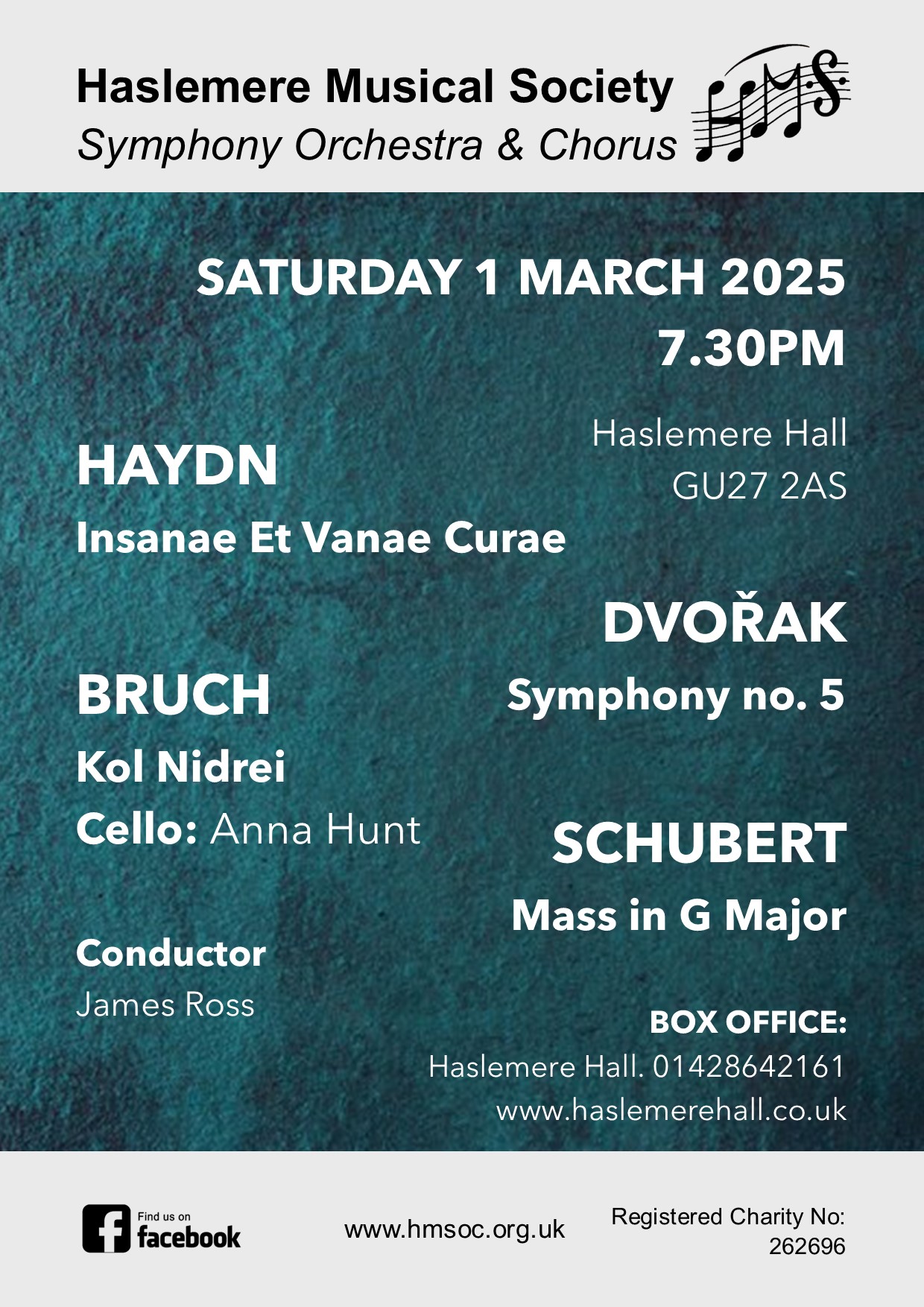
I have attended concerts by the choir and orchestra of the Haslemere Musical Society for a number of years and I believe this amateur ensemble is steadily improving. So it proved on Saturday, 1st March at Haslemere Hall. Gone is the lack of confidence that existed in both choir and orchestra just a few seasons ago. Now they are giving their public exceptional musical evenings deserving of a capacity audience. They provided us with an evening of wonderful entertainment.
The evening began with a motet by Josef Haydn (1732-1809) entitled Insanae et Vanae Curae (Vain and raging cares) published in Haydn’s final year. The choir were in confident voice backed by the orchestra, as usual, conducted by James Ross. This lively, short choral piece was superbly sung and the orchestra played with pinpoint accuracy. The motet was reworked from an oratorio 25 years earlier and is a very fine work, although not often performed these days.
This was followed by Antonin Dvořák’s (1841-1904) Symphony No. 5 in F major, in four movements. Composed in the summer of 1875, it is the first of his mature symphonies, leading to the great and very popular, Symphony No. 9, ‘From the New World’. This work was played with great enthusiasm, with punchy interludes from brass and percussion. It is not an easy piece as few of the themes are particularly memorable and not fully developed, but it was well played with superb orchestral blending. The cellos in the second movement, gave a rich sonority to the opening theme and the third movement’s beguiling melody rose from the orchestra with woodwind and horns prominent.
After the interval, we were treated to the highlight of the evening with a superb rendition of Max Bruch’s (1838-1920) Adagio on two Hebrew Melodies entitled ‘Kol Nidrei’. A popular work for solo cello and orchestra, this was brilliantly played by Anna Hunt, the lead cellist of the ensemble. I have never heard this played better, it was absolutely superb. Its mournful, soulful melodies brought out by the rich sonority of Anna’s beautiful instrument was ably accompanied by the orchestra. This was an astounding performance which will live in my memory for a long time.
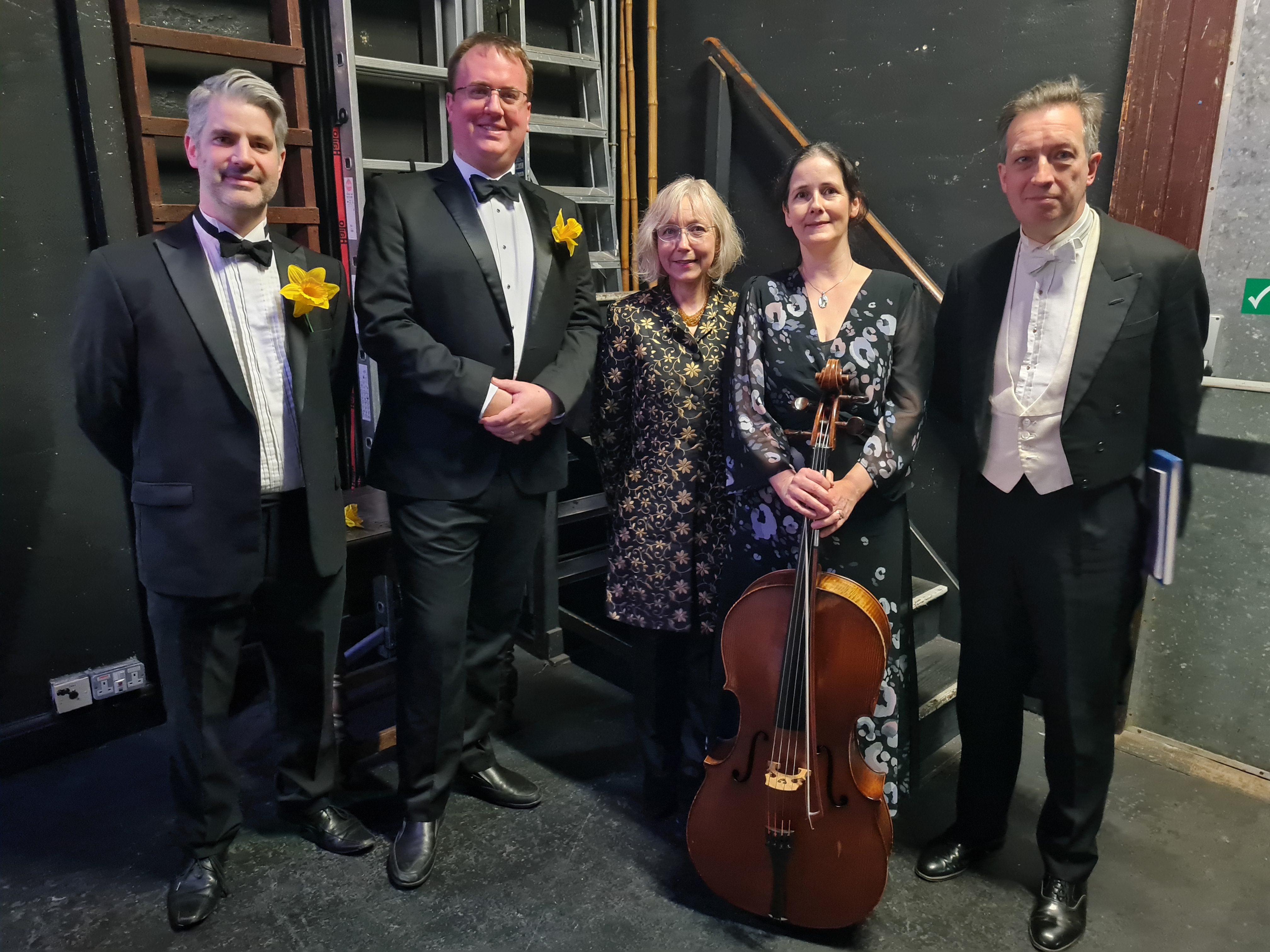
The final item of the evening was a magnificent performance by the soloists, choir and orchestra of Franz Schubert’s (1797-1828) Mass No. 2 in G. The soloists were the very impressive: soprano, Clare Loosley, tenor, Richard Thesiger-Pratt and bass, Thomas Lydon. You can always tell when the singers and players enjoy performing a work, and it was obvious during this presentation. They were really giving it their all as they really loved this work. After a rousing and confident start in the Kyrie, Clare Loosley’s strong, pure soprano broke through to captivate the audience. The dramatic Gloria, the gentle Credo, devotional Sanctus leading to the Benedictus and final Agnus Dei, completed another delightful performance. There is not much in this work for the tenor and bass soloists to display their talents in this mass, but the soprano made the best of her parts. The choir and orchestra certainly made us proud to have such musical talent in Haslemere during this performance.
A truly memorable evening was given by the members of the Haslemere Musical Society which was thoroughly enjoyed by a full house at Haslemere Hall.
Roger Saunders
President of the Recorded Music Society
December 2024 concert
December 2024 concert
7 December 2024, Haslemere Hall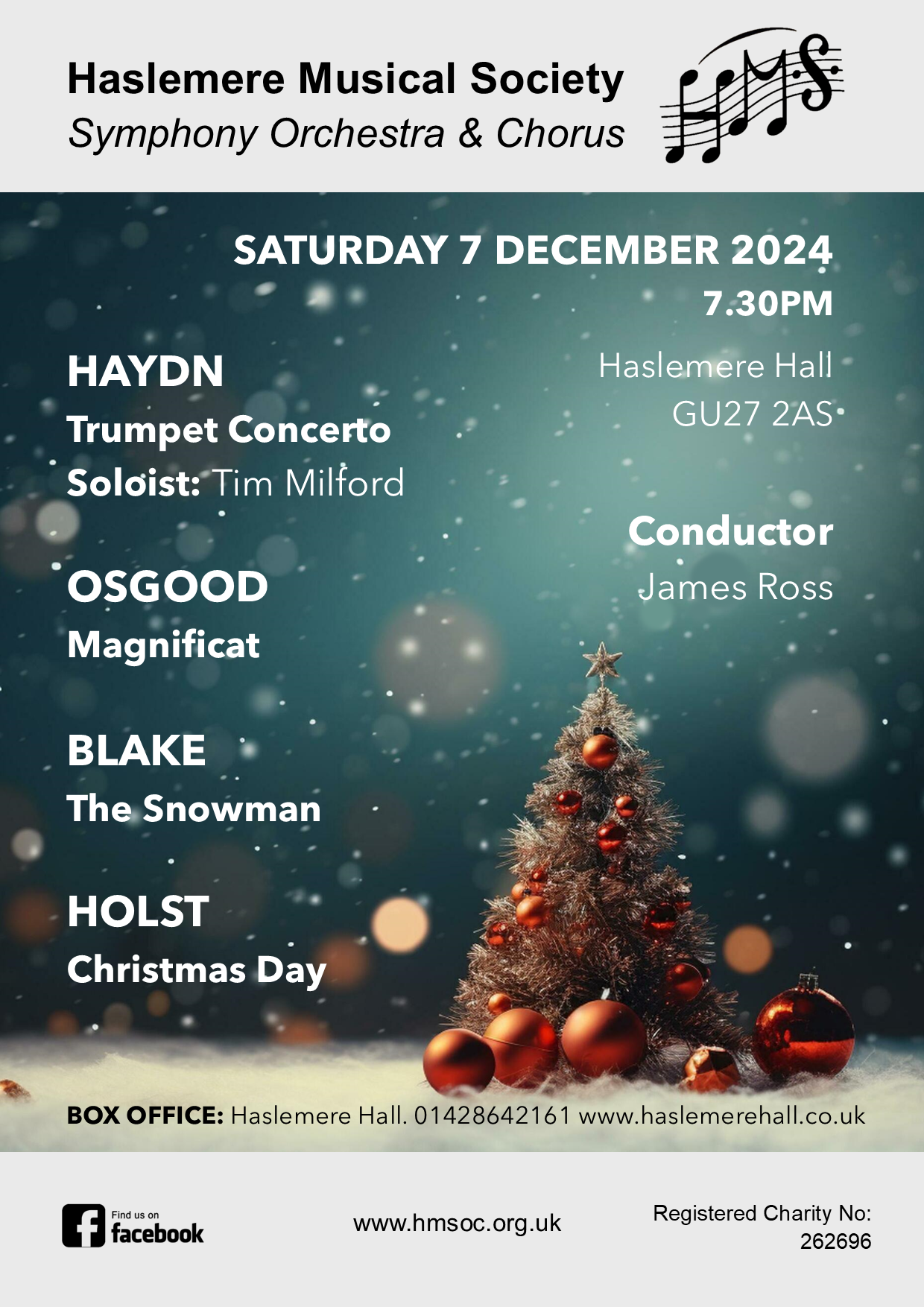 The audience at the Haslemere Musical Society’s concert in Haslemere Hall on Saturday, 7th December, were able to celebrate Christmas a little early this year. A full house attended the concert in spite of the gale force winds and driving rain that Storm Darragh had brought to the region over the weekend. Fortunately, the choir and orchestra had enjoyed a good
The audience at the Haslemere Musical Society’s concert in Haslemere Hall on Saturday, 7th December, were able to celebrate Christmas a little early this year. A full house attended the concert in spite of the gale force winds and driving rain that Storm Darragh had brought to the region over the weekend. Fortunately, the choir and orchestra had enjoyed a goodrehearsal that afternoon and this continued into the evening.
The Haslemere Musical Society Orchestra and Chorus were conducted as usual by music director, James Ross and they began the evening with a fine performance of Joseph Haydn’s very popular Trumpet Concerto in E flat, featuring able soloist, Tim Milford. This concerto has been a right of passage for talented trumpeters for over 200 years and was much enjoyed by the audience.
Local composer, Clive Osgood has a strong association with the society as accompanist at the choir’s rehearsals. His new work, a Magnificat in eight sections was featured as the second Item of the concert. This involved both choir, orchestra and a soprano soloist, Clare Loosley, who was in very fine voice. A new work is always difficult as it is unknown to the performers and the audience, but this rendition was well sung by the choir and soloist and
with superb accompaniment from the orchestra. This completed a very enjoyable first half
of the concert.
After the interval, Christmas truly arrived as the audience were treated to a thrilling
performance of Howard Blake’s wonderful children’s Christmas story entitled The Snowman.
This is a work seen, heard and appreciated every Christmas, as it usually features in the
festive television schedules. This short cartoon film was brought to life with a superb
performance by the orchestra, with vivid instrumental textures and the famous song,
‘Walking in the Air’, very well sung by treble soloist, Logan Broom. The storyline was
brilliantly narrated by David Greenwood. This was indeed a magical performance.
John Rutter’s popular Shepherd’s Pipe Carol followed, with the choir in excellent voice. This
preceded the final work of the evening, Gustav Holst’s arrangement for choir and orchestra
of popular Christmas carols, entitled Christmas Day: A Choral Fantasy on Old Carols. It
features such favourites as Good Christian Men Rejoice; God Rest Ye Merry Gentlemen; The
First Nowell and the Breton melody, Come ye lofty, come ye lowly. As expected, the choir
and orchestra gave full voice to these festive songs, ably accompanied by the orchestra.
This completed a truly delightful programme of music. And everyone returned home in
jubilant mood, ready for the Christmas season.
Once again it shows that the people of Haslemere are very fortunate in having such a variety
of excellent quality music to enjoy at every time of the year.
Roger Saunders
Haslemere Recorded Music Society
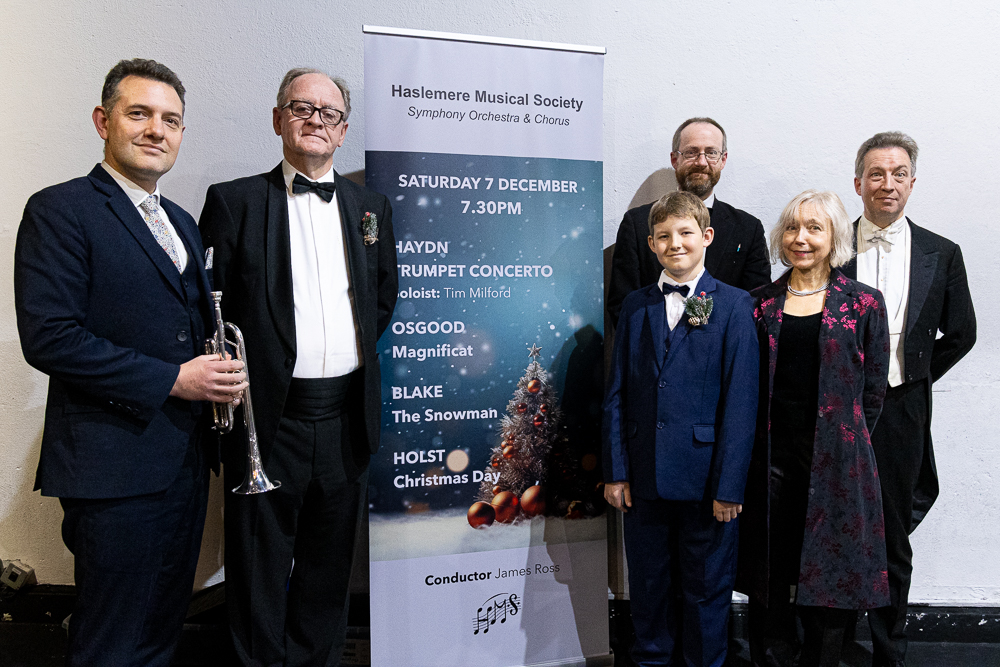
October 2024 concert
October Concert - St Christopher's Church
Saturday 12th October 2024
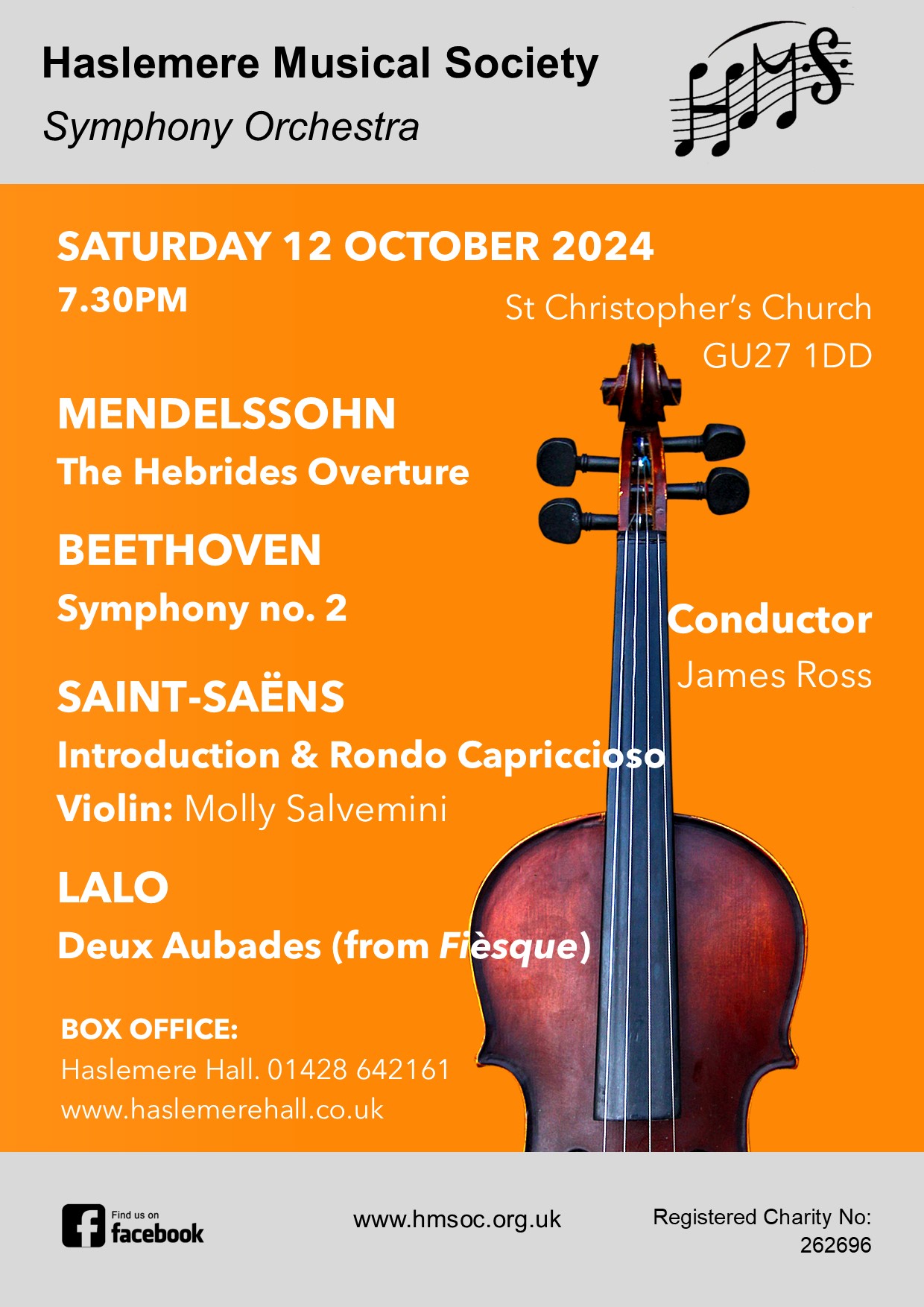 On Saturday, 12th October, Haslemere Musical Society began its 101st season with an orchestral concert at St Christopher’s Church in Haslemere, which was very well attended in spite of the chilly evening which did not deter avid music lovers. The acoustics of this church seem to suit the orchestra somewhat better than that of their usual venue, Haslemere Hall. The 40 strong amateur orchestra of mostly local musicians had gathered to entertain its audience with a fine programme of classical music, both familiar and off the beaten track. The orchestra was conducted as usual by Dr James Ross.
On Saturday, 12th October, Haslemere Musical Society began its 101st season with an orchestral concert at St Christopher’s Church in Haslemere, which was very well attended in spite of the chilly evening which did not deter avid music lovers. The acoustics of this church seem to suit the orchestra somewhat better than that of their usual venue, Haslemere Hall. The 40 strong amateur orchestra of mostly local musicians had gathered to entertain its audience with a fine programme of classical music, both familiar and off the beaten track. The orchestra was conducted as usual by Dr James Ross. The evening began with a fine performance of the very popular Mendelssohn overture, The Hebrides, often known as Fingal’s Cave, which the composer wrote in the summer of 1829 to describe his visit to the Scottish island of Staffa, with its impressive basalt rock columns. It is symphonic in nature and the orchestra played it with great enthusiasm, depicting the rough seas and stormy weather so often a feature of this region of Scotland.
This was followed by a real treat, a work by the little known French composer, Edouard Lalo (1823-92) entitled Deux Aubades for small orchestra arranged from his opera, Fiesques. This was unknown music to most of the audience but was very much appreciated. In two short movements, which acted as operatic interludes, this melodic work allowed the flute and horn players to express the delicacy and lightness of the score.
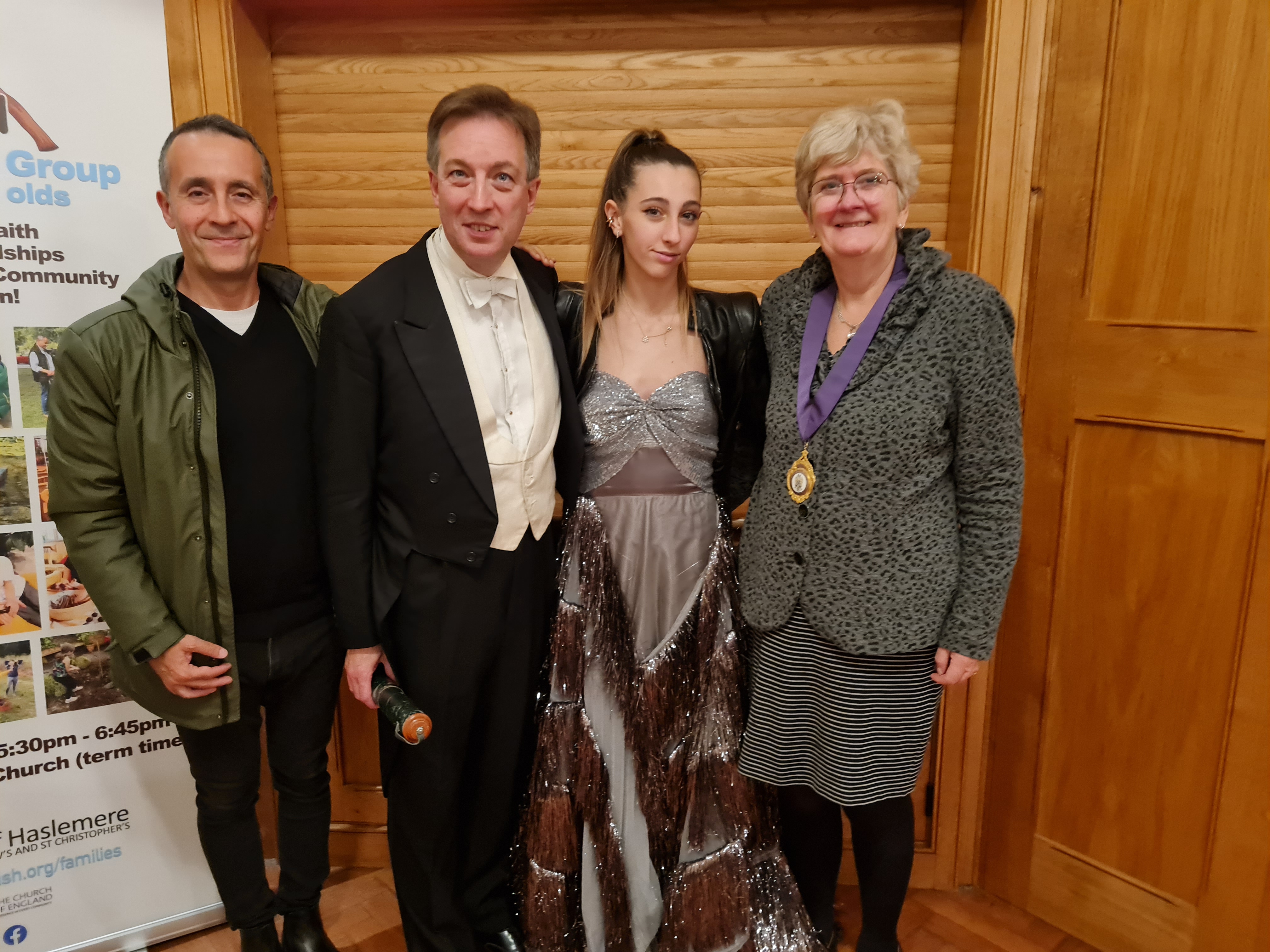 The final work of the first half of the concert introduced us to a brilliant young Italian violinist, Maria Serena (Molly) Salvemini. Appearing in a long silver tasselled evening dress with a leather jacket over her shoulders to ward off the chilly temperature in the church, she provided the audience with a spectacular rendition of Saint-Saëns wonderful work for solo violin and orchestra, Introduction and Rondo Capriccioso. This virtuoso work allows the violinist to display the complete range of skills whilst playing the two wonderful melodies of the piece. The rich sound of Molly’s violin, accompanied excellently by the Haslemere orchestra provided a breath-taking close to the opening of the concert. But, this was not all; Molly gave the audience a real treat with an encore by the virtuoso Italian violinist/composer, Niccolo Paganini’s Caprice No. 1, again displaying the fluent expertise of this fine young violinist.
The final work of the first half of the concert introduced us to a brilliant young Italian violinist, Maria Serena (Molly) Salvemini. Appearing in a long silver tasselled evening dress with a leather jacket over her shoulders to ward off the chilly temperature in the church, she provided the audience with a spectacular rendition of Saint-Saëns wonderful work for solo violin and orchestra, Introduction and Rondo Capriccioso. This virtuoso work allows the violinist to display the complete range of skills whilst playing the two wonderful melodies of the piece. The rich sound of Molly’s violin, accompanied excellently by the Haslemere orchestra provided a breath-taking close to the opening of the concert. But, this was not all; Molly gave the audience a real treat with an encore by the virtuoso Italian violinist/composer, Niccolo Paganini’s Caprice No. 1, again displaying the fluent expertise of this fine young violinist.After the interval, the orchestra provided us with the main work of the evening, Ludwig van Beethoven’s Second Symphony. Not as well known as the Eroica, No. 5, the Pastoral or the mighty Ninth Symphony, it was a real pleasure to hear this work that Beethoven composed in 1801-2, and the orchestra gave us a very fine performance. In the usual four movements: Adagio-allegro; Larghetto; Scherzo (allegro); Finale – allegro molto, the symphony is both bold and brazen in its musical language for the time, moving on from the melodic charm of Haydn and Mozart. The opening with its frequent changes of mood and tempo; the expressive Romantically inspired Larghetto; the faster pace of the scherzo and the unexpected twists and turns of the finale, a precursor to the magic of the Eroica Symphony which Beethoven composed afterward.
This was a very successful beginning to the Society’s 2024/5 season of concerts. An excellent evening!
Roger Saunders
May concert - Haslemere Hall
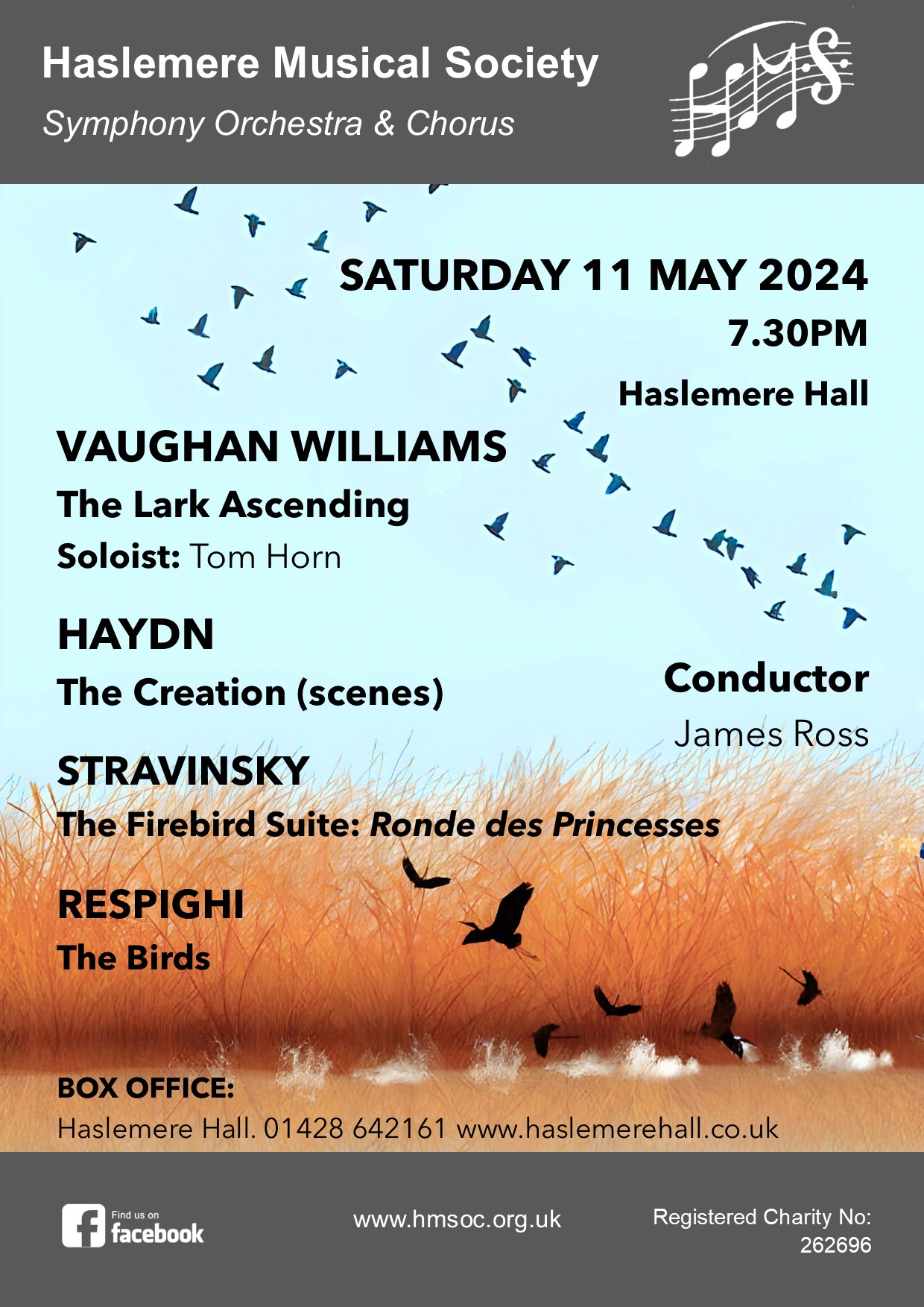 Saturday 11th May 2024
Saturday 11th May 2024
Throughout the 100 years of its existence, one of the most impressive and enjoyable aspects of Haslemere Musical Society’s regular concerts has been its ability and willingness to showcase the astonishing talent of its own members. A sold-out Haslemere Hall audience bore witness to this yet again on Saturday evening with a scintillating concert of Respighi, Stravinsky, Vaughan Williams and Haydn that shone a spotlight on many of HMS’s musicians throughout a typically well-constructed and thoughtful programme. Effortlessly balancing new listener experiences with familiar classics, conductor James Ross crafted an uplifting blend of music evoking a sense of optimism and reflection; a sentiment that was hard to resist with the evening sun streaming into the Hall.
For this, the final concert of the Society’s centenary season, Ross challenged and rewarded the audience in the first half with a playfully avian theme that began with Respighi’s 1928 suite, ‘The Birds’. The triumphant and stately opening bars set the tone before allowing us glimpses of the gentler, more lyrical subtlety to come. Rhapsodic, interwoven solo melodies in the woodwind, strings and horn were exquisitely delivered with impressive sensitivity and musicianship. The agility necessary to deliver a gentle melody one minute and imitate a nightingale the next was evident throughout and the players handled the changes of texture with skill and intelligence.
The delicate juxtaposition of shimmering, sustained ensemble playing and the mellifluous, mournful melodies of the ‘Ronde des Princesses’ from Stravinsky’s 1919 suite ‘The Firebird’ was electric. Here too, the abilities of HMS’s principal players were allowed to shine through. Slow, controlled and balanced, there were few clues as to the drama that would unfold in later movements.
Vaughan Williams’s 1914 masterpiece, ‘The Lark Ascending’, would feature amongst many people’s Desert Island Discs. Capturing the very essence of freedom and self-expression, the lark must repeatedly break free from – and return to – the orderly and grounded orchestral texture. As if his contribution thus far had not been enough, HMS’s Leader, Tom Horn, rose from his chair and delivered a spine-tingling and virtuosic performance, filled with dexterity and pathos, with the lark finally escaping into a clear blue sky – and sending us into the interval feeling at least an inch taller.
Thoughtfully selected scenes from Haydn’s dramatic 1798 oratorio, ‘The Creation’, filled the second half. Here too, home-grown talent was at the forefront of the performance; returning soprano soloist Clare Loosley is a former HMS violinist and bass soloist Tom Lydon is the current Chorus Master. They joined Guildford-born tenor, Richard Thesiger-Pratt to complete a dextrous and well-blended trio. After the hushed opening, the sudden impact of the word, “Light!”, exploding from the chorus rocked everyone back in their seats. The singers, wearing golden feathers on their lapels, allowed their obvious enjoyment to shine through as they told of the Glory of God with harps and lyres, rising suns and a new world springing up at God’s command. After the tenor’s ominous warning to Adam and Eve, the final chorus, ‘Praise the Lord, ye voices all!” raised the roof with the orchestra, chorus and soloists taking us to the close with energy, commitment and passion.
It was another wonderful evening’s entertainment from a society justly proud of its history. We can only hope that recent cuts to grant funding will not damage its ability to thrill and inspire the community for at least another 100 years to come.
William Unwin
11/05/2024
March concert - Haslemere Hall
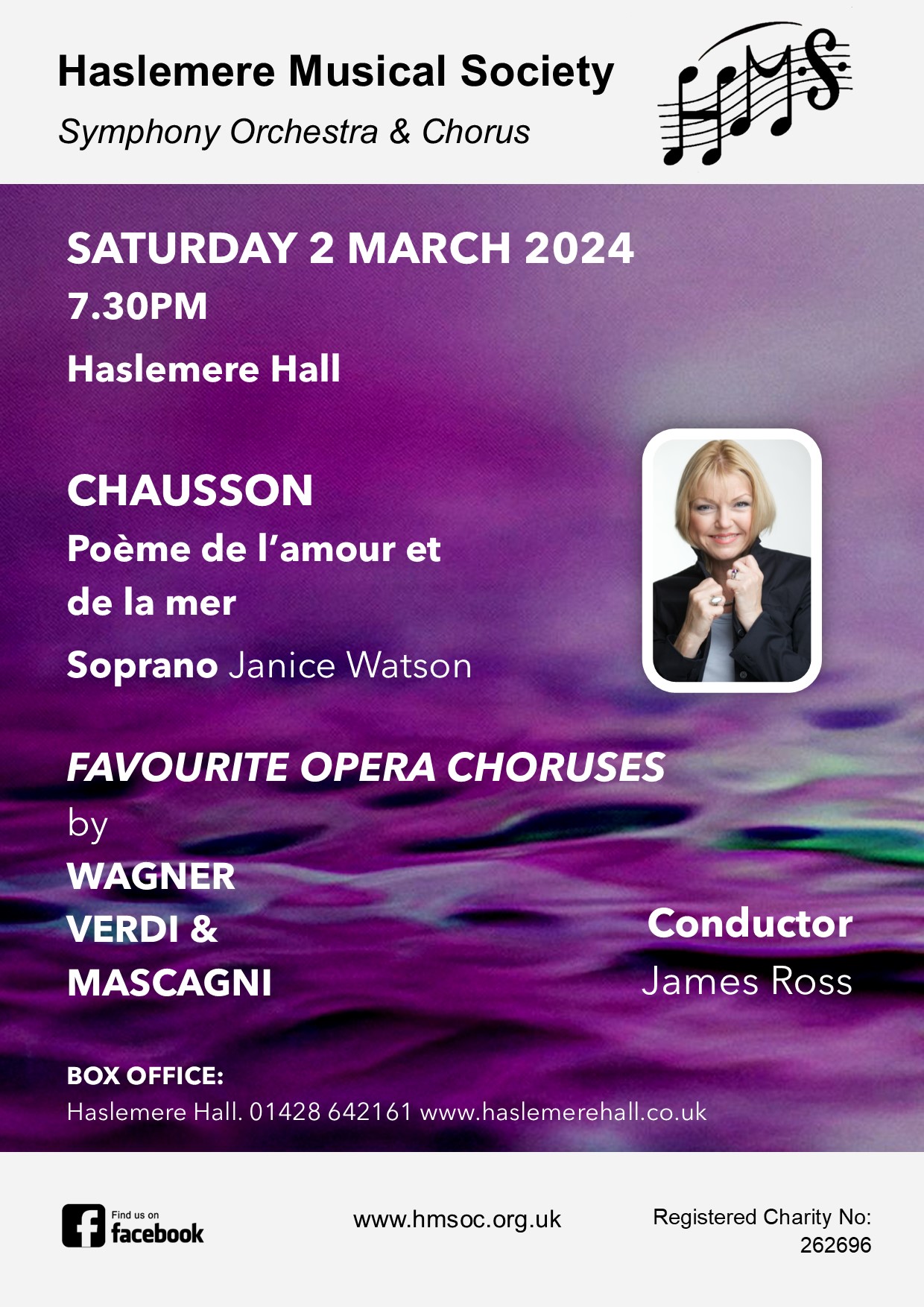 Saturday 2nd March 2024
Saturday 2nd March 2024
With floods and fallen trees blocking the roads, temperatures plummeting and the civilised world seemingly coming apart at the seams, anyone in need of warmth, reassurance and a bit of a lift would have been well advised to head to Haslemere Hall on Saturday evening. A typically varied Haslemere Musical Society programme comprising some more unusual material amidst a wealth of instantly recognisable, whistle-along classics provided an evening of entertainment filled with joy, pathos, excitement and reflection.
Under the direction of conductor James Ross, the orchestra’s declamatory opening salvo set the tone with the prelude to Act III of Wagner’s Lohengrin – a rollicking rollercoaster of a ride that showed off the players’ ability to shift effortlessly from raucous to touchingly sensitive at the flick of a baton. The singers, immaculate in black with daffodils on their lapels, joined in for the Bridal Chorus and more than a few of the audience could be spotted humming along
Ernest Chausson’s Poème de l’amour et de la Mer formed the majority of the first half with soprano Janice Watson demonstrating the power, deftness of touch and range of vocal colour that has brought her such international acclaim. Rarely performed in the UK, Poème is a masterpiece of an orchestrated song cycle with the orchestra providing so much more than mere accompaniment. Whilst soaring, plaintive woodwind and string solos (particularly in the Interlude) demonstrated individual skill and musicianship, the warmth and sensitivity of the orchestra allowed Watson to move effortlessly through the texture, taking us to the interval and a welcome glass of wine.
From start to finish, the second half was a joyous romp through some of the repertoire’s most famous opera choruses by Giuseppe Verdi and Pietro Mascagni with the choir taking centre stage. The ‘Overture’ and ‘Chorus of the Hebrew Slaves’ from Nabucco galvanised Tom Lydon’s well-drilled and enthusiastic singers, whilst the impressive array of improvised percussion in the ‘Anvil Chorus’ from Il Travatore evoked a tangible sense of the Gypsy tinkers celebrating their work, wine and women.
‘Rataplan della Gloria’ from La Forza del Destino delighted the audience, and the famous trumpet melody from Aida’s sumptuous ‘Grand March and Ballet Music’ made it almost impossible not to tap a foot or two.
To finish, a contrasting pair from Mascagni’s one-act Opera, Cavalleria Rusticana. The Intermezzo, with its haunting oboe lines and soaring string melodies, was the perfect palette-cleanser before the evening’s triumphant finale of the Easter Hymn. The echoes of Watson’s glorious final top B sent the audience away into the frosty darkness with a spring in their step, a smile on their face and, undoubtedly, humming a tune or two.
William Unwin
03/03/2024
Centenary concert - Haslemere Hall
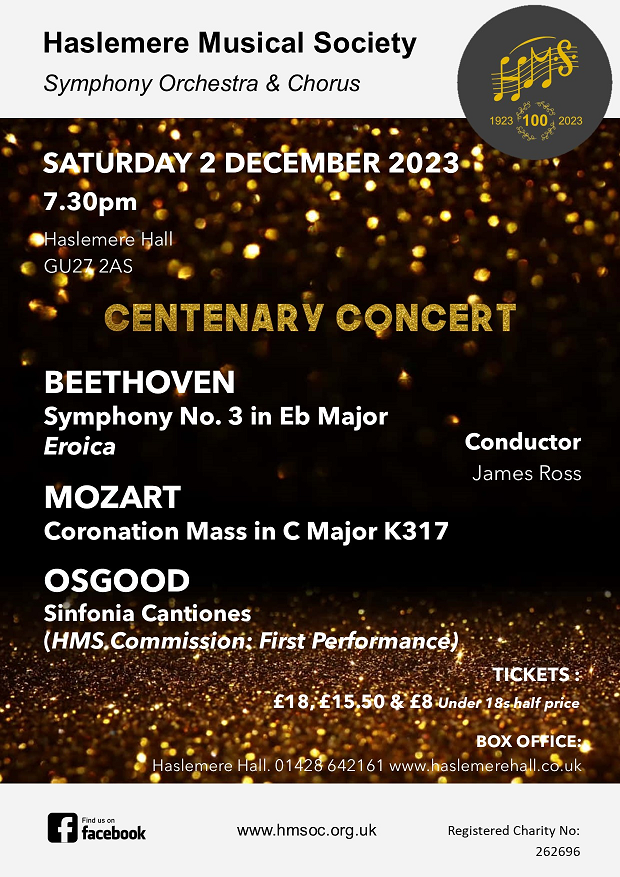 Haslemere Musical Society – The First 100 Years
Haslemere Musical Society – The First 100 Years
The Haslemere Musical Society, founded by Annie Bristow in 1923, marked its centenary year with a concert in the Haslemere Hall on 2nd December 2023, featuring two ageless war-horses of the classical repertoire and the first performance of a new work commissioned for the occasion. The Society, unusually for such organisations, comprises both a symphony orchestra and a choir. Over the years of its existence it has mounted some 250 concerts covering a substantial part of the classical repertoire, at a standard well above what a largely amateur group might be expected to attain. This has enabled the HMS over the years to attract a succession of international soloists such as the sopranos Felicity Lott and Janice Watson and the cellists Steven Isserlis and Alexander Baillie.
The evening started, as it had in 1923, with a full-blooded rendering of Beethoven’s Eroica Symphony, initially intended by the composer to be dedicated to Napoleon Bonaparte, a proposal subsequently withdrawn because of the composer’s disgust at the French dictator’s assumption of an emperor’s crown. The orchestra seemed fully alive to the way this music is driven to its destiny with a kind of logical inevitability, right through to the frenetic climax of the last movement at which point, just for a moment, we fear that the orchestra might have forgotten how to stop. A wonderful show-piece for this group of talented players.
The choir then joined the orchestra for an affectionate account of Mozart’s Coronation Mass, so called because it was first performed at the coronation of the Hapsburg emperor in 1792, the year after Mozart’s death. The well-disciplined HMS Chorus provided a pleasing backing to the more florid contributions by the soloists, Clare Loosley (soprano), Charlotte Tetley (alto), Timothy Dutton (tenor) and Thomas Lydon (Bass).
Finally there was the new work by Clive Osgood, Composer, Assistant Chorus Master and Accompanist for the Haslemere Musical Society and Director of Music and Organist at St Bartholomew’s Church, Haslemere. The work is entitled ‘Sinfonia Cantiones’ and is constructed round the melodies and words of three medieval carols, with just enough ‘off-colour’ harmonies to announce itself as a work of the 21st century’. It was certainly easy on the ear, the musicians apparently relishing some moments of relative relaxation after the challenging rigours of the works that had preceded it.
Haslemere can be proud of its achievements in classical music as HMS’s Director of Music, James Ross suggested in his elegant speech to round off the occasion. We can look forward to the bicentenary year in 2123 with some confidence that the Society will survive that long, even if its individual members may not.
To finish, a contrasting pair from Mascagni’s one-act Opera, Cavalleria Rusticana. The Intermezzo, with its haunting oboe lines and soaring string melodies, was the perfect palette-cleanser before the evening’s triumphant finale of the Easter Hymn. The echoes of Watson’s glorious final top B sent the audience away into the frosty darkness with a spring in their step, a smile on their face and, undoubtedly, humming a tune or two.
Tony Goldman
Concert - St Christopher's Church
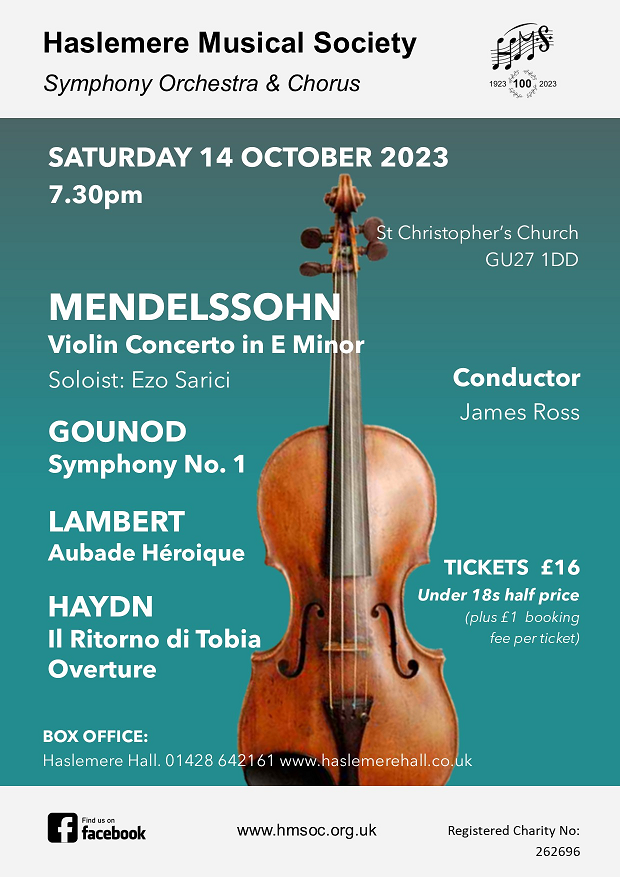 Opening Night Success
Opening Night Success
The Orchestra of the Haslemere Musical Society opened its 100th season with an inspirational concert at St Christopher’s Church, Haslemere, on Saturday, 14 October 2023, to an enthusiastic packed audience which included the Mayor of Haslemere, Councillor Jerome Davidson. We were treated to an evening of the popular and the less well-known regions of the classical music spectrum.
The concert began with the overture to Il ritorno di Tobia, Franz Josef Haydn’s first oratorio, which is based on the story of Tobit and his son Tobias from the Apocrypha, set in Nineveh. This short work was given a confident opening by the orchestra which includes a selection of Haydn’s delightful melodies from this seldom performed oratorio. The work was composed and first performed in Vienna in 1775.
English composer Constant Lambert (1905-51) was the founding music director of the Sadler’s Wells Ballet, (1931-47) subsequently the Royal Ballet, and is best remembered for his ballet music (Horoscope, Pomona) and his work for piano, choir and orchestra, Rio Grande (1927). The HMS Orchestra gave us a less often performed example of his output, Aubade héroique (1942) which was dedicated to Vaughan Williams, one of his tutors.
As conductor James Ross explained, Lambert’s Aubade héroïque looks back, in its dreamlike serenity, to Debussy’s Berceuse héroïque, for piano composed in November 1914. Lambert had taken the Sadler’s Wells Ballet on a tour of the Netherlands and became trapped due to the German invasion. Lambert explains that “this short piece was inspired by a daybreak during the invasion of Holland, the calm of the surrounding park contrasting with the distant mutterings of war." From the cor anglais’s entry before the orchestra joins in with gentle strings and individual instrumental highlights and distant trumpet calls before the music fades away. This captivating work was charmingly played by the orchestra.
We were then introduced to the evening’s soloist, Ezo Sarici, a young Turkish violinist who is training at the Royal Academy of Music and has won many prizes for her musicianship across Europe. She treated us to an excellent and very emotional performance of Mendelssohn’s wonderful Violin Concerto in E minor. The soloist blended superbly with the orchestra. It often sounded as if the violin was crying, such was the emotion created by this wonderful concerto. Indeed, the depth of feeling on the soloist’s face matched the melancholic mood of the music. A truly superb performance.
After the interval, we were introduced to Charles Gounod’s Symphony No. 1 in D, a work that is seldom programmed in current times. Gounod is known more for his operas, Faust (1859) and Romeo et Juliette (1867). Although composed in 1855, almost 30 years after Beethoven’s death, this work sounds more like Haydn or Mozart without a hint of romanticism. In the usual four movements, fast, slow, minuet-like scherzo and slow-fast finale, it is certainly not ahead of its time. It opened with a Haydnesque allegro with brass interjections; the delightful second movement was lively, even if the melodies were far from memorable. The minuet-style scherzo led into a slow introduction to the finale which ended with a boisterous allegro vivace. The work was well played by the orchestra and they were courageous in tackling such an uninspiring symphony.
This was a fine musical evening which was much enjoyed by the assembled music loving clientele. The highlight of the evening was undoubtedly the wonderful performance of Mendelssohn’s Violin Concerto by the guest soloist, Ezo Carici. It was a delight to hear such a professionally competent presentation of this justly popular concerto in Haslemere. We left the church into a cold evening with musical warmth in our hearts.
Roger Saunders
President - Haslemere Recorded Music Society
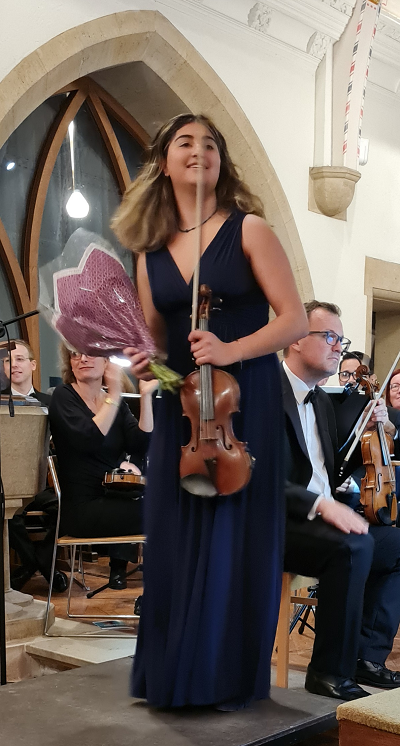
May 2023 Concert
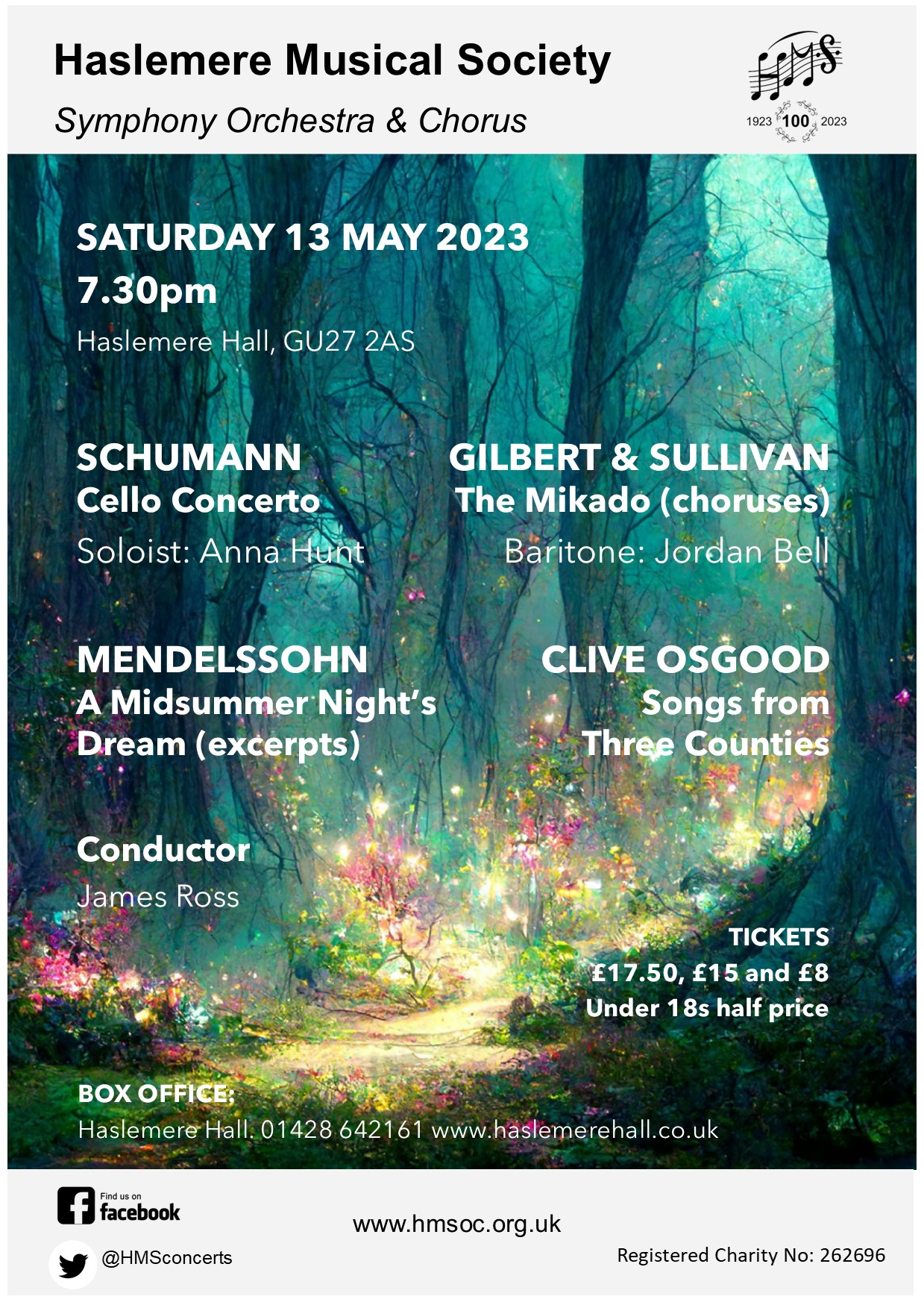 Haslemere’s Answer to Eurovision
Haslemere’s Answer to Eurovision
Whilst much of the nation’s television audience was watching the 2023 Eurovision Song Contest, Haslemere Hall was hosting a musical event of a very different kind. As part of the Haslemere Musical Society’s centenary year, their choir and orchestra offered Mendelssohn, Schumann, Gilbert & Sullivan and a song cycle by local composer, Clive Osgood, in a concert sponsored by the Shottermill Great War Memorial Trust.
The evening began with the orchestral half of the concert featuring incidental music from Felix Mendelssohn’s musical version of Shakespeare’s ‘A Midsummer Night’s Dream’. The well known Overture was followed by the Nocturne and the very popular Wedding March. The strings began quietly before the full orchestra joined in with some panache, albeit more slowly in tempo than is usually heard. The Nocturne with exposed horn and bassoon playing has a melody of great beauty depicting the stillness of the night and this cedes into a faster section to denote the lover’s emotional turmoil. The famous Wedding March of Theseus and Hippolyta, still used at many weddings brought these extracts to a triumphant close.
There were two highlights of this concert and the first was a performance of Robert Schumann’s seldom heard Cello Concerto in A minor, composed in 1850, but not played during his lifetime, as he died within six years at a mental institution. The featured soloist was the very talented Anna Hunt, from the orchestra’s cello section who is a local music teacher at both Bohunt and the Royal School. Anna played this concerto with such expression and emotional feeling that her audience was transported by the warmth of her expertise and musicianship. I felt she encouraged the orchestra to raise the bar in their playing of this work, as they seemed to gain confidence to give their soloist the best possible support. This fine cello concerto should feature more often in orchestral concert programming, particularly when it is played as well as it was on this occasion.
After the interval, we were treated to a song cycle entitled, ‘Songs of Three Counties’ by local composer and the society’s chorus master, Clive Osgood, who is very well known locally. The five songs featured were derived from folk tunes from the counties surrounding Haslemere: Sussex, Hampshire and Surrey, but all had connections with the sea. ‘All things are quite silent’ tells the story of a woman whose lover has gone to sea and his departure is depicted in ‘The Privateer’. ‘The Royal Oak’ is the name of the victorious ship in battle, after which the sailors sight ‘The Mermaid’, an omen of impending doom and finally, ‘The Ship in Distress’ tells the story as the sailors experience their ship drifting far off course. The authors of the songs were not given, but the choir and orchestra presented them with great feeling, but on occasions the volume of the orchestra tended to overshadow the choir. A delightful set, but I felt the music may have benefitted from a more ‘sea-shanty’ like flavour in the music.
The evening came to its conclusion, and my second highlight, with excerpts from Gilbert and Sullivan’s popular operetta, The Mikado, featuring guest G&S specialist baritone, Jordan Bell, giving vent to the satirical songs more about Victorian England than medieval Japan, but that was how such operettas gained their popularity. The chorus and orchestra rose to the occasion in support of their superb soloist. We heard excerpts including: Our Great Mikado, The Lord High Executioner, I’ve got a little list, Comes a train of little ladies, Brightly dawns our wedding day, Miya sama, A more human Mikado, The criminal cried (better known by the phrase ‘The Punishment fits the crime’), On a tree by a river (Tit Willow) and the finale, He’s gone and married Yum-Yum and The threatened cloud has passed away. The choir and soloist sang these popular excerpts extremely well and Jordan Bell was a superb interpreter of the complex lyrics. Altogether this was a most enjoyable evening.
Roger Saunders
Haslemere Recorded Music Society
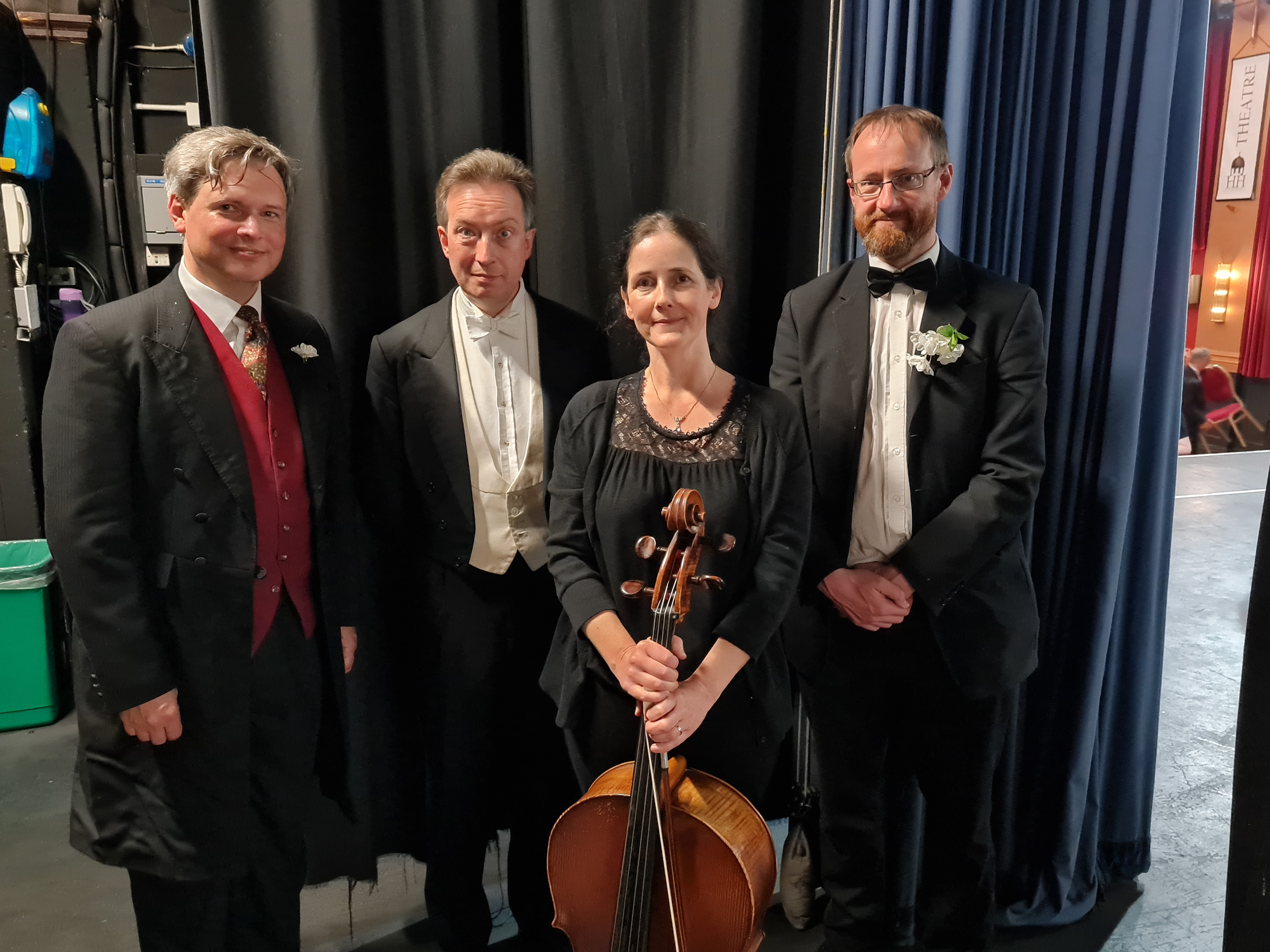
March 2023
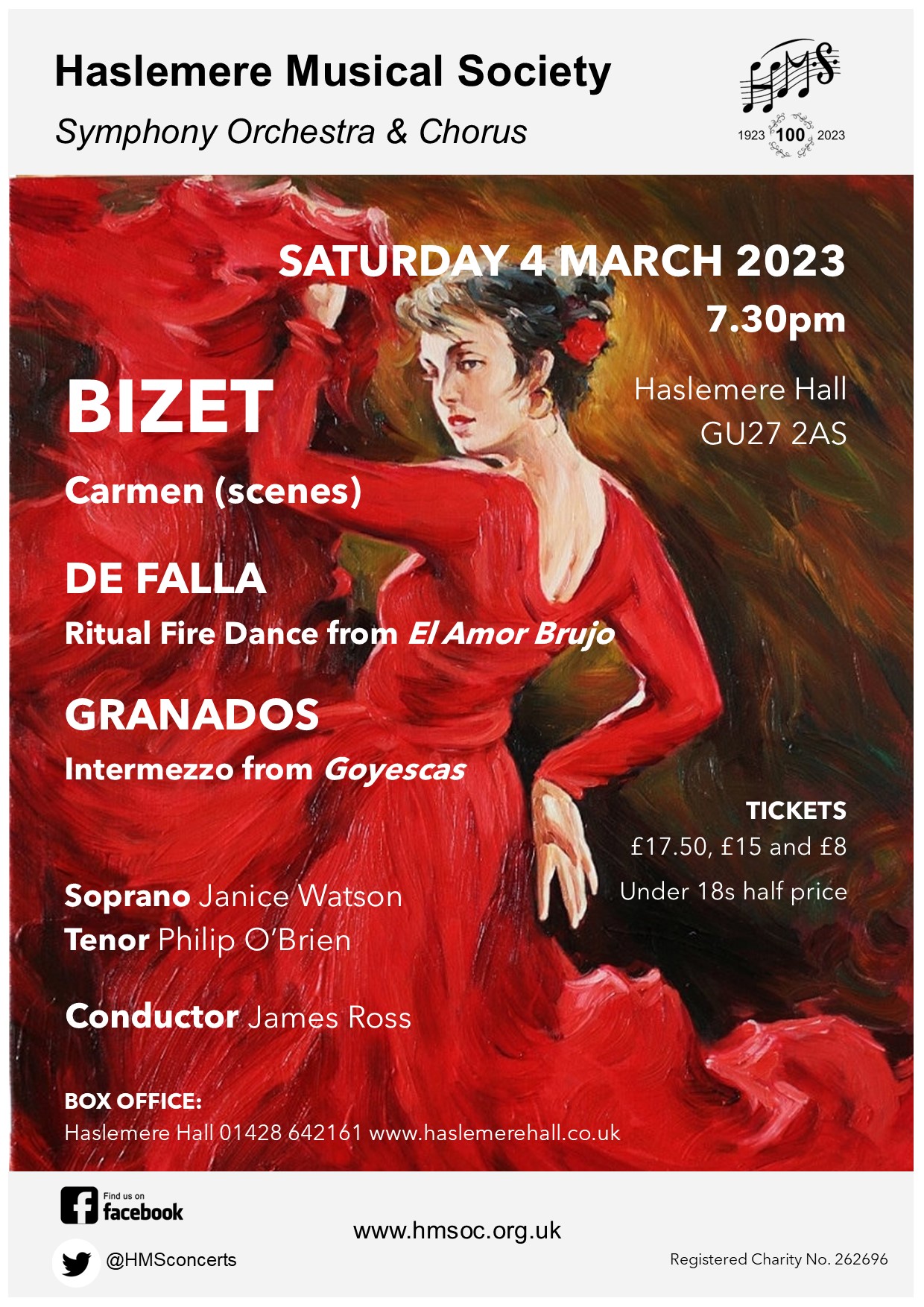 Haslemere Musical Society’s very successful ‘Carmen’ Evening
Haslemere Musical Society’s very successful ‘Carmen’ EveningAs we move into springtime, Haslemere Musical Society brought some welcome, warm Spanish sunshine on a bitterly cold evening at their concert in Haslemere Hall on Saturday, 4th March. Those attending were rewarded by hearing the orchestra, chorus and soloists perform a programme of wonderful Spanish influenced music. This was an evening filled with popular, well known melodies and the performers certainly raised their game to delight the full house of music lovers attending.
We began with the popular orchestral Intermezzo from Enrique Granados’s opera, Goyescas, (after the Spanish artist, Francisco Goya). The orchestra treated us to a rousing performance although somewhat slower than the usual tempo. This was followed by the popular Ritual Fire Dance from Manuel de Falla’s ballet, El Amor Brujo (Love, the Magician), featuring some fine playing in the woodwinds. Conductor, James Ross, explained the pieces played to the audience, but stated that the plot of the main work of the evening, Scenes from George Bizet’s popular opera, Carmen, was so complex that only a brief description was possible. The programme notes provided a more thorough explanation of the story. The opera is sung in French, the language of the composer.
To round off the first part of the evening we were treated to the Prelude and selected choral scenes (Habenera; Seguidilla) from Act 1 of the opera, which also introduced us to the two brilliant soloists, soprano, Janice Watson taking the role of the fiery seductress, Carmen and her partner in drama, well known local tenor, Philip O’Brien, (Haslemere Singing Studio tutor) as the soldier, Don José. They both played and sang their roles with passion, power and commitment. Although this was a concert performance, Philip knew his role so well, he didn’t need to use the libretto.
After the interval, we heard various popular scenes and arias from Act 2, including the Bohemian Dance, the Toreador Song and the Flower Song; Act 3, including the Card Scene and Act 4, with the chorus ‘A deux cuartos’, The Bullfighter’s Procession and Carmen’s Death’, where she is stabbed by Don José, having refused his declaration of love. Of particular note was the excellent timing of the guest percussionist, Neil Marshall, whose role is so important in this strongly rhythmic music in driving the music forward and keeping the timing tight.
It seemed that the performance of the soloists, chorus and orchestra got better and better as the evening progressed, obviously down to the wonderful music they were enjoying as they sang and played. This opera is full of absolute showstoppers and the Haslemere Musical Society gave it their best. A truly wonderful musical evening. Congratulations to all who provided us with such musical warmth on this cold March evening.
Roger Saunders
Haslemere Recorded Music Society
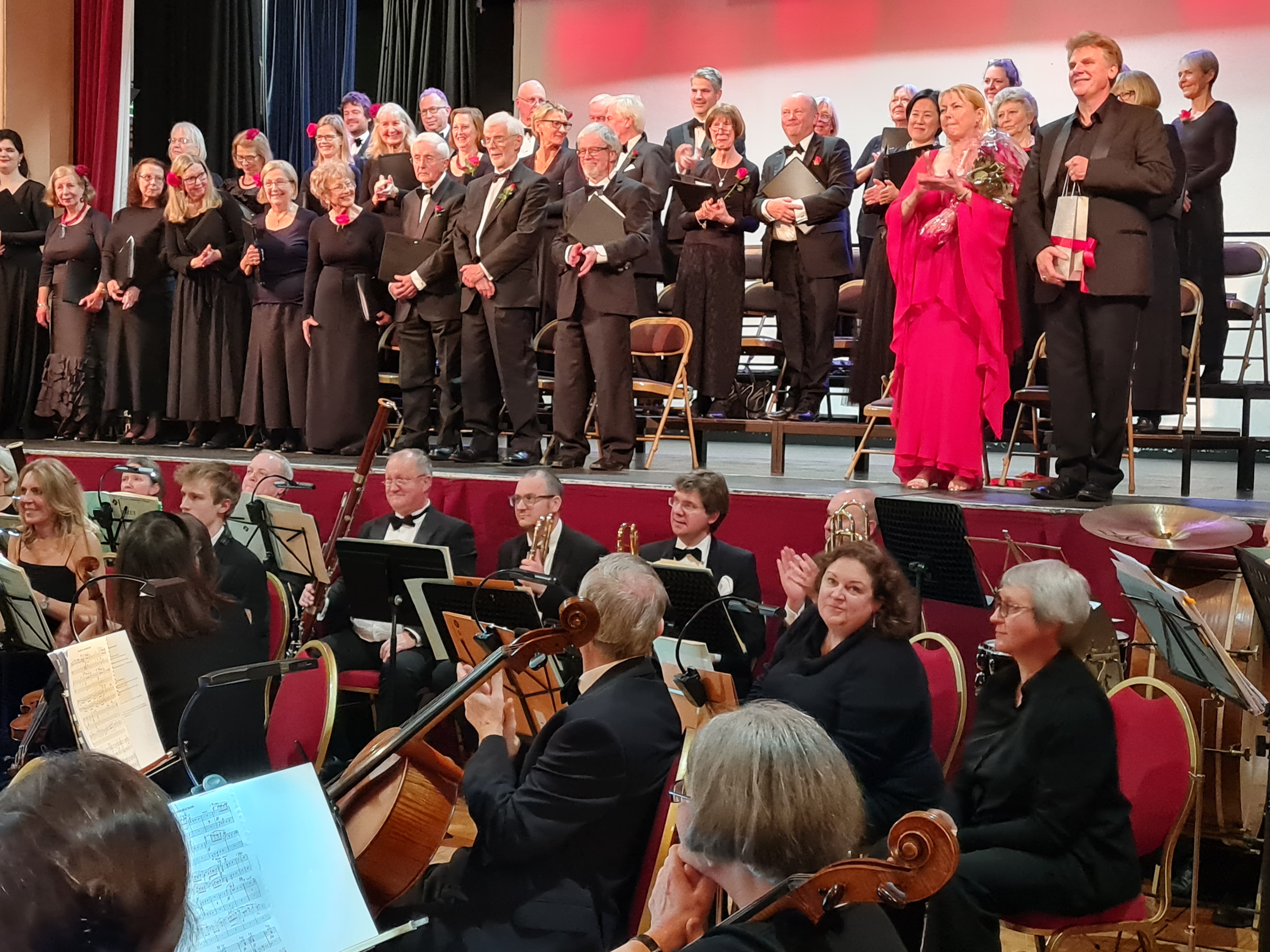
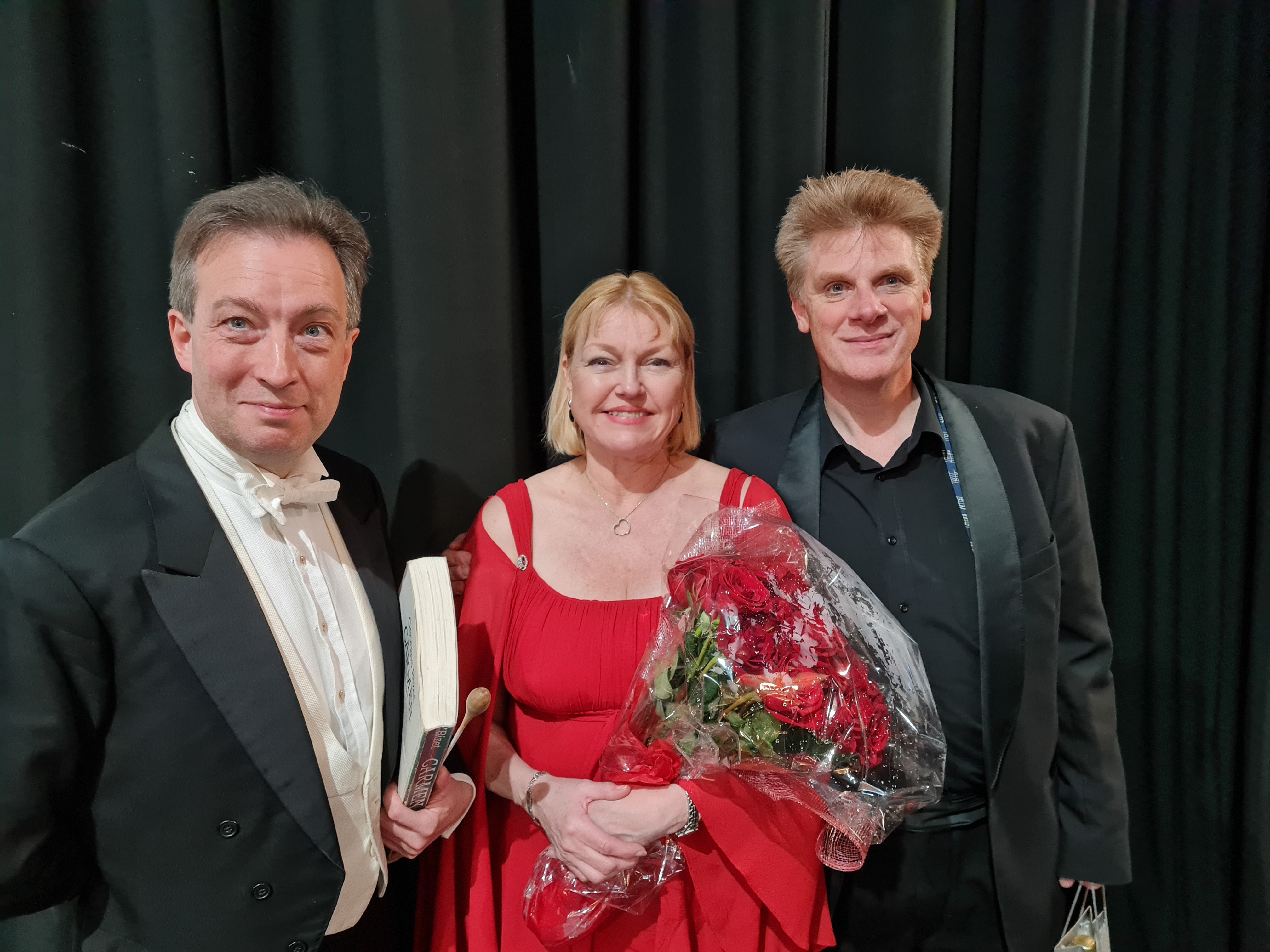
December 2022
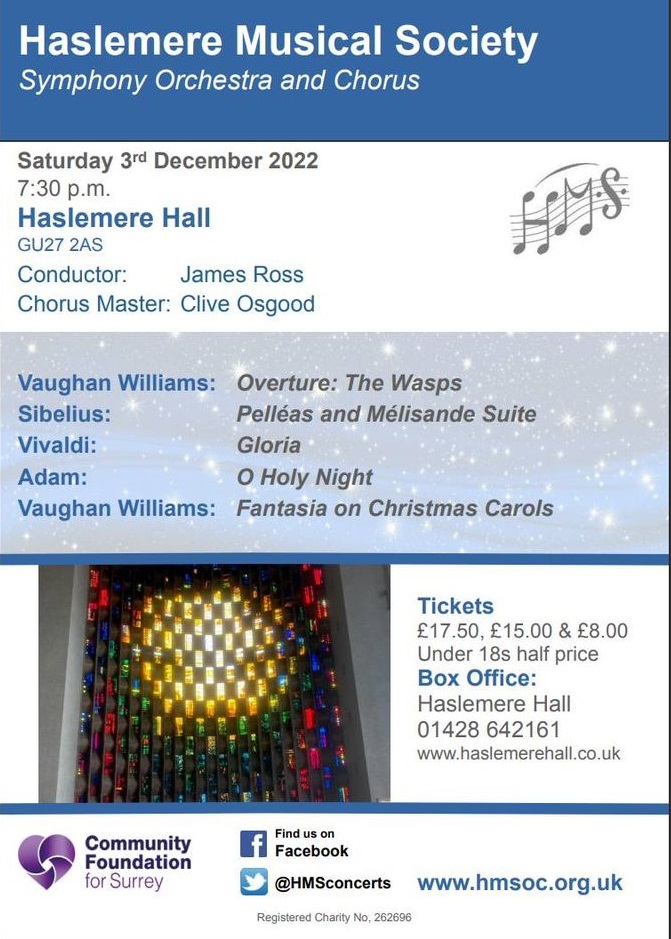 HEART WARMING MUSIC FOR A COLD DECEMBER EVENING
HEART WARMING MUSIC FOR A COLD DECEMBER EVENINGOn a bitterly cold December evening, the Haslemere Musical Society’s Choral and Orchestral concert brought much cheer to the audience at Haslemere Hall with a fine programme of music in the approach to the Christmas season. Although the choir was somewhat light in numbers, they sang heartily in the second half of the evening’s festive musical menu.
The first half was devoted to two orchestral works: first, Ralph Vaughan Williams’ Overture, The Wasps. Composed in 1909, for the performance of a Greek play by Aristophenes, in Cambridge, the overture shows the benefit of Vaughan Williams’ recent studies with Ravel in the colour of the orchestration, particularly how the strings imitate the sound of wasps buzzing around the landscape. The orchestra began confidently with the folk inspired melodies which appear throughout the piece.
The second item was a very challenging suite for an amateur orchestra, Sibelius’s Pelléas and Mélisande, again a work composed in 1905, to accompany a play by Maurice Maeterlinck. The suite is a set of twelve scenes from the play which Sibelius illustrated with wonderful melodies which describe the various moods both colourfully and economically. The images created include the swell of the sea and a cor anglais solo, beautifully played by Luke Owlett in the Three Blind Sisters scene. Sibelius allows each featured instrument to be clearly heard above the orchestral playing. In fact, there was particularly fine playing from the woodwind section in this work.
The second half featured both soloists and choir backed by the orchestra and brought us right into the Christmas season. Antonio Vivaldi’s very popular (second) Gloria in D, RV 598, is packed with delightfully joyous tunes, beginning with repeated ‘Glorias’. The orchestra seemed to step up a gear whilst playing this wonderful music and the choir gave it their all. Featured soloists, Clare Loosley, Kerrie Stevenson (sopranos) and Helen Bendall (alto) sang beautifully, although poor Helen had been suffering health problems which reduced the power of her voice somewhat. This sacred work is in twelve sections alternating full choir and solo parts and this was the highlight of the concert in my estimation.
A second work by Ralph Vaughan Williams, in the 150th anniversary year of his birth, brought us right into Christmastide with his lovely Fantasia on Christmas Carols. Composed in 1912, for the Three Choirs Festival, just after he had edited the English Hymnal, it includes a folk tune that RVW collected in Herefordshire, The Truth Sent from Above. This was beautifully sung by guest bass soloist, Thomas Lydon. The second carol is Come All you Worthy Gentlemen, originally from Somerset, and is followed by On Christmas Night and fragments of a further carol, all combining to make a magnificent seasonal work. The choir sang this superbly, spendidly backed by the orchestra. It is not an easy work to sing, but they carried it off extremely well.
The final work was a favourite carol by French composer, Adolphe Adam, Cantique de Noël, composed in 1850. We know this in English, as it was sung, as O Holy Night. This wonderful carol was an ideal way to bring the concert to a seasonal close and was again very well sung and accompanied. Haslemere has a wealth of musical talent in the area and we were treated to a delightful evening of music to bring in this season of good cheer amidst all the economic crises that we are experiencing. Well done, Haslemere Musical Society. Their next concert is on 4th March, 2023 when they perform Scenes from Bizet’s opera, Carmen.
Roger Saunders
Haslemere Recorded Music Society
October 2022
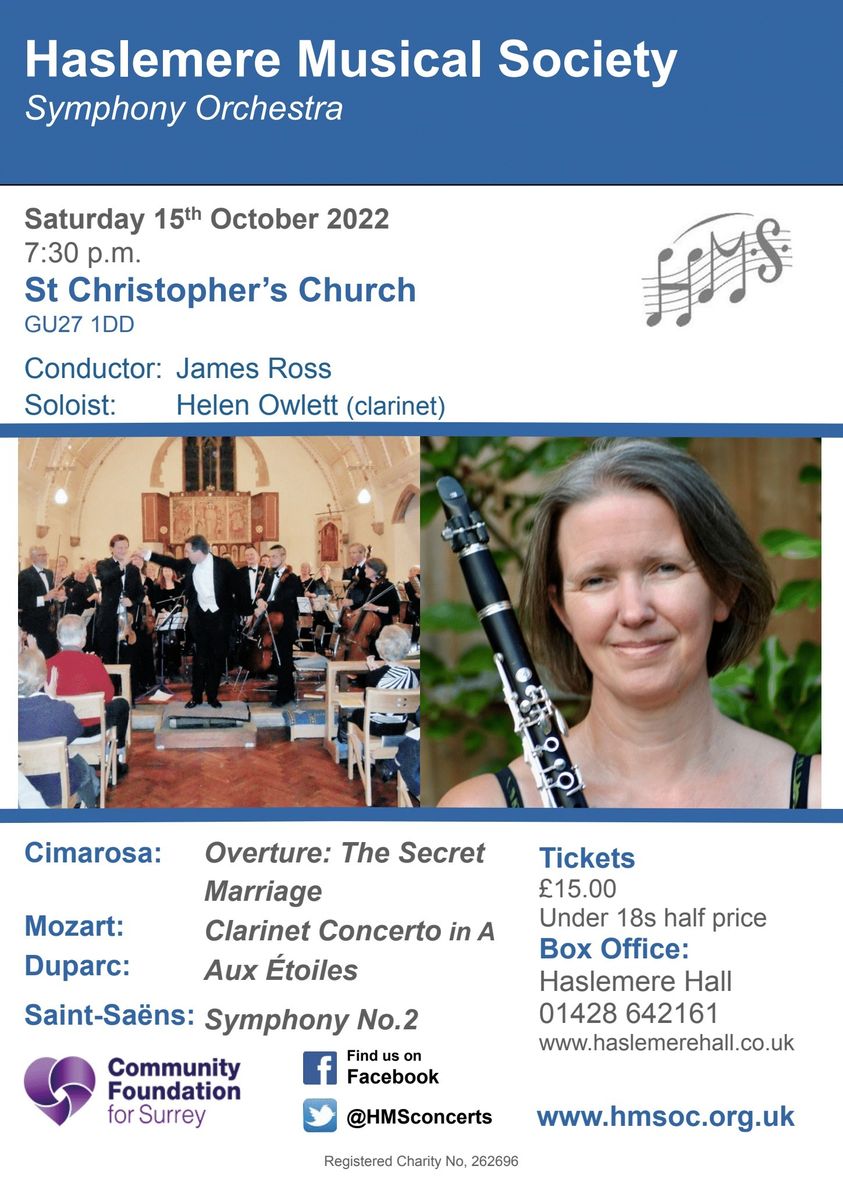 ORCHESTRAL CONCERT AT ST. CHRISTOPHER’S
ORCHESTRAL CONCERT AT ST. CHRISTOPHER’S
On Saturday night (15th October), Haslemere Musical Society held their first concert of the season at St. Christopher’s Church, Haslemere, instead of their usual venue, Haslemere Hall. In addition, this was a purely orchestral event rather than the usual chorus with orchestra. The concert was attended by the Mayor of Haslemere, Councillor Jacquie Keen and her husband, and she gave a much appreciated vote of thanks at the end of the evening. Also notable was the content of the programme, which ventured outside the usual orchestral ‘middle of the road’ fare that most venues offer. The audience numbered over 80, which was exceptional for the season’s first event at a different venue.
We began with Domenico Cimarosa’s overture to his little known opera, The Secret Marriage (1792). This piece relied upon cribbed excerpts from Mozart’s much better known The Magic Flute Overture which was premiered a year earlier in Vienna. The orchestra began strongly with a huge sound in the superb acoustics of the church. A very promising start to the evening.
Mozart’s extremely popular Clarinet Concerto in A, K622, was offered next and featured a very fine performance by the orchestra’s principal clarinetist, Helen Owlett. This work was composed in 1791, the year of Mozart’s death, for his friend, the virtuoso clarinetist, Anton Stadler. The work is full of wonderful melodies which feature the soloist prominently in the highest and lowest notes of its range of possibilities. Helen played this very difficult work with great assurance, with the warmth of her clarinet sounding confidently over the orchestral backing. Incidentally, Helen’s son, Luke played in the oboe section of the orchestra.
After the interval, another virtually unknown work by French composer, Henri Duparc, (once a pupil of Cesar Franck) and his orchestral poem, Aux Étoiles. This was composed in 1874, but Duparc is better known as a composer of French songs. This work was intended as the first of a three pieces for orchestra entitled Poème Nocturne, but Duparc abandoned the project. He was a very self-critical composer and destroyed most of his works. I don’t think this particular piece rises above the ordinary as it has little memorable melodic content.
The evening was brought to a close with Camille Saint-Saëns’ Second Symphony, composed in 1859. Although not as popular as his Organ Symphony (No. 3), this four movement symphony begins with a fugue which has a cyclic connection to the other movements. The second movement opens simply on a single bass note and progresses in the manner of a salon gavotte. The Scherzo is stormy and dramatic, with a central, syncopated section. The final movement shows the influence of Haydn, with a tarantella-like dance and some brilliant trumpet work. It also includes a quote from Mendelssohn’s A Midsummer Night’s Dream, yet the music retains its fervent and boisterous sense of originality. A section for muted strings is captivating, and the music heads to its close with variations in tempo. Although I noticed some suspect tuning occasionally in the violins, this didn’t mitigate the overall quality of the evenings performances, which were finely played by this amateur local orchestra and it certainly does no harm to Haslemere’s fine musical reputation. A most enjoyable evening was once again, had by all. If you missed this concert, their next event is at Haslemere Hall on Saturday, 3rd December, and features works by Vaughan Williams, Sibelius, Adam and Vivaldi. It should be a wonderful evening to begin the Christmas season.
Roger Saunders
May 2022
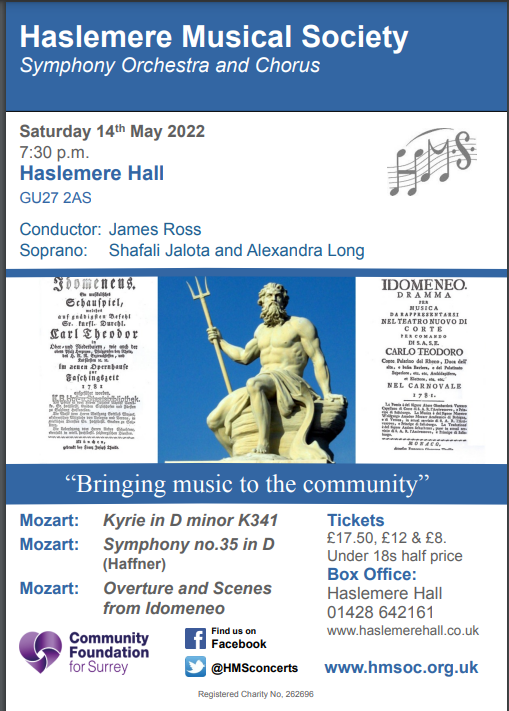 AN EVENING WITH MOZART
AN EVENING WITH MOZARTOn Saturday, 14th May, Haslemere was treated to an evening of music composed by the Austrian genius, Wolfgang Amadeus Mozart (1756-91), in a concert delayed by two years due to Covid, at Haslemere Hall. Haslemere Musical Society, the local amateur symphony orchestra and chorus, performed three items from Mozart’s extensive catalogue of over 600 works: a Kyrie in D minor, K341, sung by the 29 members of the choir and supported by the 35 strong orchestral complement. This was followed by a performance of Mozart’s Symphony No. 35, known as the ‘Haffner’, as it was composed in celebration of Sigmund Haffner’s ennoblement, a family friend of the Mozarts since childhood. After the interval, the choir was augmented by two professional soloists and the orchestra performed a selection from Mozart’s opera, Idomeneo, depicting an episode from the era of the Trojan Wars. All these works were composed in the period, 1780-2, a time when Mozart was leaving his native Salzburg to become a free-lance composer/musician in Vienna, although it is now thought that the Kyrie may have been a later work.
After a tentative opening, the Kyrie was well sung by the choir. This is a celebratory work using the simple text: Lord have mercy, Christ have mercy, Lord have mercy.
The Haffner Symphony, K385, is a bright, upbeat orchestral work which shows off Mozart’s pre-eminent gift for writing beautiful melodies. Woodwind was strongly featured and very well played even in exposed passages. It was certainly played ‘with fire’ as Mozart had written to his father, Leopold. Although in recent times this symphony is not as popular as it once had been, this occasion made one wonder why we don’t hear it more often.
After the interval, the choir and orchestra performed selected arias, recitative and orchestral parts of Mozart’s opera, Idomeneo, based upon the return of King Idomeneo of Crete to his homeland after the Trojan Wars. He has made a pact with Neptune to sacrifice the first person he meets upon his safe arrival, which proves to be his son, Idamante, and the opera is concerned with how this plays out.
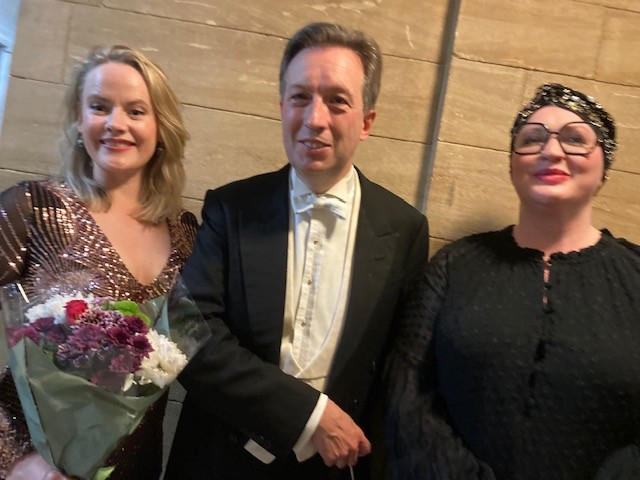
The chorus were joined by two professional soloists, Lizzie Holmes (soprano) as Ilia, a last minute stand-in for the indisposed Shafali Jalota and Alexandra Long (mezzo) as Elettra, both vying for the hand of Idamante. Both soloists were excellent, expressive, clear and with powerful voices filling the hall. I was particularly impressed by two young female choir members, Kerrie Stevenson and Sarah Furbank, who performed duets. Both were musically secure and provided an uplifting presence to their singing which was widely commented upon after the performance. The finale with full orchestra and chorus brought the end to a very enjoyable evening of Mozart’s fabulous music. Well done everybody!
Roger Saunders
President, Haslemere Recorded Music Society
March 2022
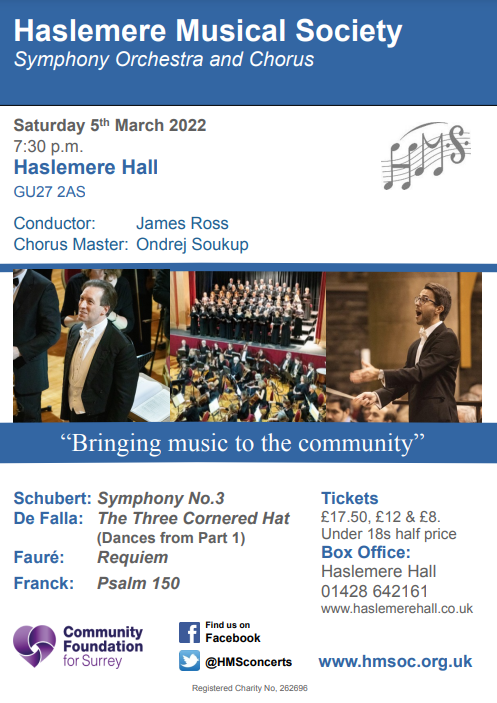 How good to have live music coming back to Haslemere, especially with the enthusiasm shown by both choir and orchestra who performed a range of very different choral and orchestral works before a packed house, knowledgeably conducted by Musical Director, Dr James Ross.
How good to have live music coming back to Haslemere, especially with the enthusiasm shown by both choir and orchestra who performed a range of very different choral and orchestral works before a packed house, knowledgeably conducted by Musical Director, Dr James Ross.Schubert’s Symphony No. 3 in D opened the concert with a confident, rich, full sound played with sensitivity matching the composer’s own youthful exuberance. The Allegretto - a graceful movement enhanced by delightful woodwind playing, led to the 3rd movement: Menuetto - Trio - Menuetto, in a very distinctive minuet form; one which the brass and woodwind captured most convincingly. Finally, a tarantella-style Presto vivace finale, allowed all sections of the orchestra to show their expertise in a thrilling conclusion.
Very different in both mood and scale, were the scenes and dances from Manuel de Falla’s ballet The Three-cornered Hat, based on a novel with a comic storyline by Pedro de Alarcón. This more challenging ‘chamber orchestra’ work has a complex interplay of instruments; played with conviction, the orchestra caught the mood expertly of boisterous rustic sounds intruding into a placid pastoral sound-world, capturing just the right spirit of the piece; of particular note being the woodwind and brass soloists.
After the interval, the second half restarted with César Frank’s Psalm 150 and it is hoped this piece will be better know after this performance. Unlike many other settings, it begins with a solemn ‘Hallelujah’ expressing humility before the Creator, before ending with a climax of praise: ‘Let everything that hath breath.’ The tuneful music allowed both choir and orchestra, (with the more complex harmonies), to show their range of skills throughout.
The Concert Hall then fell silent for a short pause, as we remembered those suffering in the conflict in the Ukraine, and who are not able to share the liberties - of which joyful, unrestricted music-making is one - which we all freely enjoy.
The concert closed with Faure’s Requiem - a well-known and much-loved work, the portrayal of the pilgrimage of a soul to the divine. Rather than trying to match the ‘grand’ sound of other requiem settings (of Verdi or Berlioz for example), this performance was entirely in accord with this more intimate scale of writing and contrasting style of the movements. The Treble soloist, Sam O’Brien, sang with poise and clarity in the Pie Jesu, perfectly in keeping with this interpretation. The Baritone soloist (Ond?ej Soukup), matched this, not with the usual detached, formal style, but one that you could empathise with, in the soul’s heartfelt pleading for deliverance.
From the opening, the full, rich sound of the Requiem æternam commanded immediate attention, to the final angelic, transcendent In Paradisum, an unlaboured performance led us through the full range of human feelings.
Credit is also given to Ond?ej Soukup, Chorus Master, and to Clive Osgood, Assistant Chorus Master and Keyboard, who have clearly worked hard with the Chorus to develop a clear understanding of the significance of both words and music. Mention should also be made of James Ross’ comprehensive programme notes.
All who support live music in Haslemere, will surely look forward to the next HMS Concert on Saturday, 14th May, which promises to be an enthralling Mozart evening.
December 2021
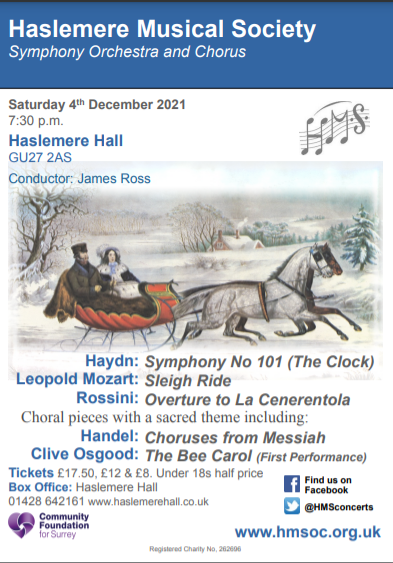 On Saturday evening, 4th December, Haslemere Musical Society returned to its usual venue, Haslemere Hall for its annual Christmas themed concert, after a break of 21 months, due to covid restrictions. An earlier, orchestral only concert had taken place in October this year, but without the choir. Haslemere Hall was filled with an audience eager for the resumption of normal musical activities, so important at this time of year, and they were not disappointed. Although space was somewhat limited due to the socially distanced orchestral placing, we were able to enjoy the full sound of 40+ musicians and the added benefit of similarly sized choir to fill the hall with music.
On Saturday evening, 4th December, Haslemere Musical Society returned to its usual venue, Haslemere Hall for its annual Christmas themed concert, after a break of 21 months, due to covid restrictions. An earlier, orchestral only concert had taken place in October this year, but without the choir. Haslemere Hall was filled with an audience eager for the resumption of normal musical activities, so important at this time of year, and they were not disappointed. Although space was somewhat limited due to the socially distanced orchestral placing, we were able to enjoy the full sound of 40+ musicians and the added benefit of similarly sized choir to fill the hall with music.The concert began cautiously with Rossini’s Overture to La Cenerentola (Cinderella), but when the tempo increased, the full power and dynamics of the orchestra were apparent, particularly when the first theme for strings entered the fray. This is a superb piece to begin any concert as it contains so many of Rossini’s wonderful melodies. Conductor, James Ross, then welcomed the audience and explained the ideas behind the opening work and the next item, Haydn’s Symphony No. 101, ‘The Clock’, one of the symphonies that Haydn brought to London in the 1790s. This is a bright, chirpy and melodic work full of good tunes and the second movement’s ‘tick-tock’ rhythm given prominence by the pizzicato cellos and woodwind, gives the work its title. The third movement Minuetto-allegretto, was played with great fervour and reminded one of the Womble’s pop hit in the 1970s, with a similar name.
After the interval, it became the choir’s turn to join in the proceedings and we were treated to some mellifluous a capella singing with the Dixit Maria by Hans Hassler (c.1564-1612). This was the first of five short pieces from across the centuries, including Ave Maria Stellis by Edvard Grieg (1843-1907), Exsulatate Justi by Lodovico Viadana (c.1569-1627), Unser Lieben Frauen Traum by Max Reger (1873-1916) and Johannes Brahms (1833-97) Geistliches Lied (Sacred Song). The choir was in good voice throughout, although the prominence of the sopranos and the relative small number of basses gave the works a brighter, less full bodied sound than is usually the case.
A chamber music interval provided the audience with the opportunity of hearing an arrangement for wind ensemble of two movements from Dvorak’s Czech Suite, which were superbly played by the wind section of the orchestra. This work was dedicated to Anne Goldman (1938-2021), who for many years played the clarinet in the HMS orchestra and organised its summer sessions.
Then we came to the real meat of the evening, the seasonal choruses from Handel’s wonderful oratorio, Messiah. We heard: And the glory of the Lord shall be revealed; And He shall purify the sons of Levi and finally, For unto us a child is born. This told us that Christmas is just around the corner and gave us the expected jubilant sound of Handel’s excellent, enthralling work, which has been popular for 280 years. The choir and orchestra gave it their all and the audience was delighted; it really lifted the mood on a dark and bitterly cold night. Amateur choirs just love to sing these exceptional choruses from Handel’s most popular and performed work and the Musical Society choir made that obvious to us all.
The next item was a special treat. Local composer, Clive Osgood had composed his Bee Carol, to a poem by Carol Ann Duffy, in 2018, for the BBC3 Carol Competition. Clive was present to play the keyboard accompaniment to this lovely seasonal work which was given its premiere performance at this concert. The concert ended with Leopold Mozart’s Sleigh Ride (Schlittenfahrt) from his Divertimento in F for orchestra. Complete with sleigh bells and a jaunty tune, it brought the evening to a very successful close and was enjoyed by all attending and those taking part, sending us away into the night, warm and contented. The next HMS Concert is on 5th March 2022 at Haslemere Hall.
October 2021 concert
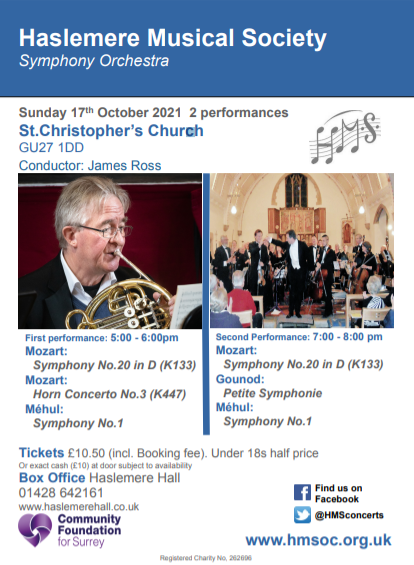
Review
Haslemere Musical Society sprang into action, after the eighteen month hiatus caused by the coronavirus pandemic, with two orchestral concerts at St Christopher’s Church in Haslemere on Sunday, 17th October. A chamber- sized orchestra presented two hour long concerts, each featuring performances of Mozart’s Symphony 20, composed in 1772 in Salzburg and Étienne Méhul’s Symphony 1, composed in 1808. The early concert also included Mozart’s 3rd Horn Concerto, superbly played by soloist Roger Doulton. The later concert featured Charles Gounod’s Petite Symphonie for wind octet and flute. The orchestra was conducted by James Ross, well known to Haslemere’s concert-goers.
Mozart’s lively early symphony was a really positive way to begin these concerts as it is a festive work complete with trumpet flourishes, dialogue between the winds and strings and complete with Mozart’s usual trills and adornments. The sound filled the wonderful acoustic of this lovely church, so often used for performances of classical music. The lilting theme of the second movement was followed by a short minuet before the fast, breathless finale. It showed that the orchestra was on really good form.
Mozart’s third Horn Concerto followed with the soloist stepping out from the orchestra to perform this very popular work. Roger Doulton coped extremely well with the intricacies Mozart had written for the soloist. This was joyful, exuberant horn playing by a very capable amateur musician.
Méhul’s four symphonies are not well known and seldom played in the current era, but they are fine works and deserve to be heard more often. So HMS gave Haslemere the opportunity of experiencing the first of these works. The strongly percussive nature of the opening made one realise that time had moved on. We were now in the Romantic era, more akin to late Haydn and Beethoven, with greater energy and a much broader soundscape. The grand opening movement was followed by a gentle slow movement with raucous low horn calls. Pizzicato strings featured in the minuet before we were strongly reminded of a theme from Beethoven’s Fifth Symphony. However, neither composer met although both works were composed in 1808. This work established Méhul as France’s first Romantic composer.
Gounod’s Petite Symphonie allowed the wind section of the orchestra to step up and show their mettle. Composed for just nine wind instruments, it begins with a slow hymn-like theme before the tempo increases. Jaunty rhythms, a ‘hunting horn’ scherzo and a trio that has the feel of a country dance. This lovely work was a treat for the ear.
Unfortunately, the attendance at both concerts was much lower than expected, something that appears to be the norm following the pandemic lockdowns. This in no way seemed to affect the performance by the orchestra, who were collectively strong, very tight rhythmically and provided a wonderful return to live music in Haslemere.
Roger Saunders
March 2020 concert
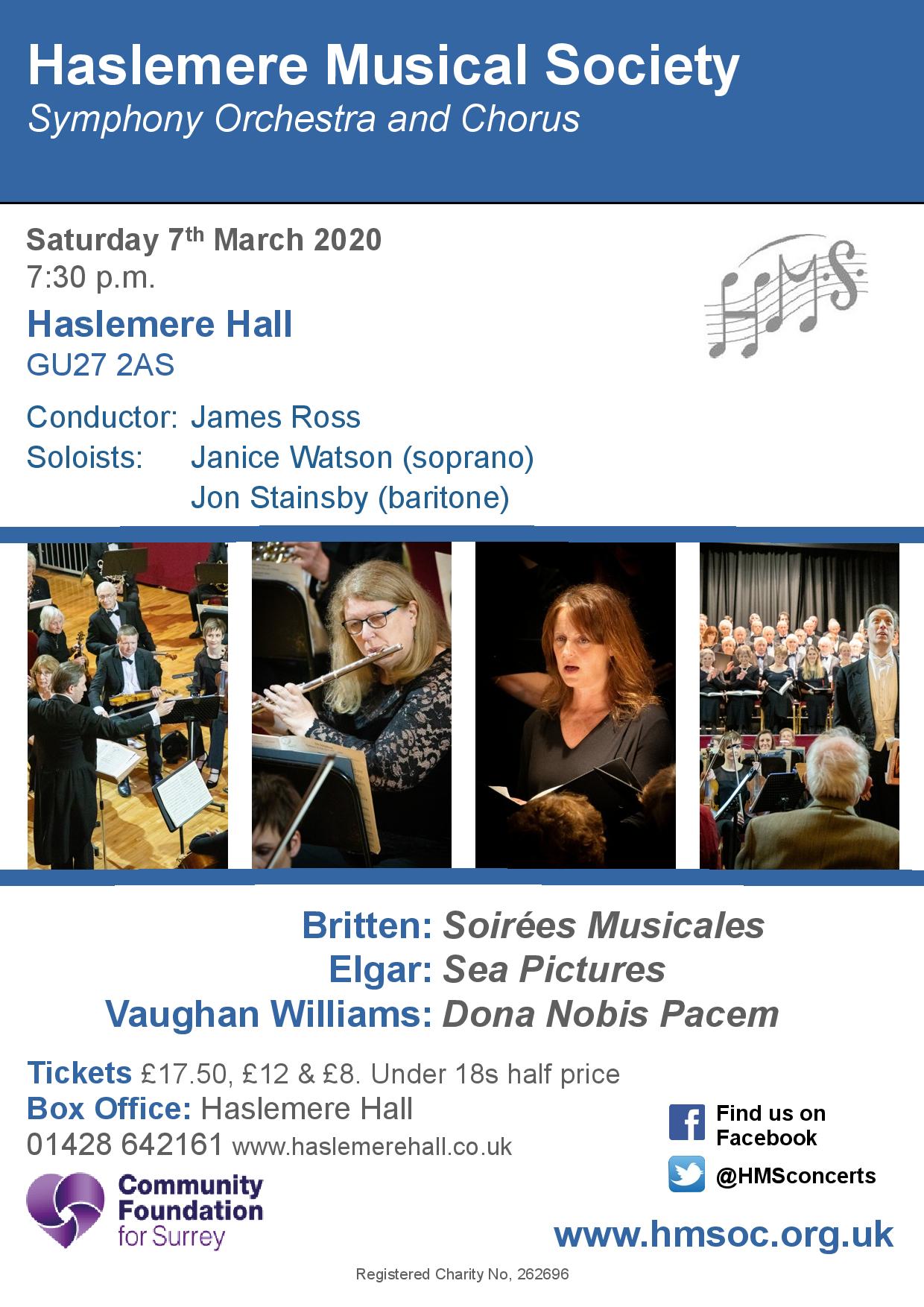
Review
This was a night of exceptional music making under the inspiring baton of Dr James Ross, meeting the challenge of very different pieces with enthusiasm and musical skill. There was something for everyone from four giants of British music. The first half started exuberantly with Soirées musicales, Benjamin Britten’s rearrangement of Rossini. The orchestra played the five contrasting pieces spiritedly, with a lightness of touch, while being honest to the precise musical writing.
A quite different work in mood and colour followed; Frederick Delius’ Walk to the Paradise Garden. The orchestra met the very different demands of sustained lyricism and generally slower tempi, yet sustaining the expressive musical form.
It is always a challenge to bring new insights to well-known pieces, but this is clearly what accomplished soprano Janice Watson did to Elgar’s Sea Pictures, demonstrating the wide range of her vocal skill and understanding.
The second half consisted of a splendid performance of Vaughan Williams’ Dona Nobis Pacem. Both the choir and orchestra acquitted themselves excellently in this complex and emotionally demanding work. This is Vaughan Williams response to his first-hand experience of the horrors the First World War and the looming second: very clearly an anti-war cantata. The work might be relatively short, but packs a mighty punch. The poems of Walt Whitman may be an acquired taste, (though used previously in Vaughan Williams’ Towards the Unknown Region), combined with the words of comfort from the Christian scriptures and the Mass. Though interspersed with the salutary words of John Bright MP – a re-casting of the comforting words of the Hebrew Passover, and those of the prophet Jeremiah.
Throughout, the two soloists, soprano, Janice Watson and baritone, Jon Stainsby, brought a depth of understanding and emotional power to their performance. From the opening Agnus Dei to the last Dona nobis pacem, controlled yet with an intensity fading to nothing, Janice’s singing matched the words perfectly. Jon Stainsby also showed his full range of musical skills, from the dramatic to the intense anguish of his words in Reconciliation: “for my enemy is dead, a man divine as myself is dead.”
Mention must be made of Cole Bendall as Chorus Master, and Clive Osgood, Rehearsal Pianist, who have melded the voices into a harmonious whole; articulate, with clarity of diction and a clear understanding of the sentiment of the music and words. Mention should also be made of the team who put together the programme with its comprehensive notes.
One has to remind oneself that the performers were predominantly amateur, who gave fine performances of very different and complex works. It is to be sincerely hoped that Haslemere Musical Society will continue to prosper and perform to such a high standard.
Robert Mitchell


